Text
Think about it, you can just see it now. Nathaniel Hawthorne ability analysis.
Why? Uhh, I don’t know. I wanted to do a character in the guild for once and I kinda liked The Scarlet Letter.
3 notes
·
View notes
Text
Maybe I was just sad writing that reblog because I have to live with disagreeing with 99% of the fanbase, but at least I know some people understand why I think so.
I have much cooler stuff to talk about then my depressing crap. All in my oven…. To bake…. And to simmer…. Ahhhhhhh
2 notes
·
View notes
Text
I should rewrite this one day. There are more engaging things to talk about in BSD, but this topic is dear to me. It’s also very painful. I didn’t write it with any plan, so some of my arguments are not as strong as I’d like them to be and I do notice that I brush some things off too quickly. There are also some things I’d change. Nothing too big, but I think could be improved.
I mean I wrote it in about a week or so. It makes me embarrassed with how I structured everything.
How do I say this… I don’t think abuse can be cleanly restricted into a box, but I find that others put too little barriers between it and other labels. I find that very annoying. That is why I established an understanding of abuse before anything else was to be argued because it’s so easy to not understand the difference between psychological abuse and one instance of emotional manipulation. They can easily lead into each other, so it’s good to know when there’s a barrier.
Here are some key points I made on another post for abuse that I think are generally most specific to abuse when put together:
Disregarding the autonomy of the victim
Uses fear and intimidation tactics
Psychological power dynamic that weighs on the victim
is repeatedly** forced to do/victim of something that causes psychological harm
(**if there is not much to argue for repetition, be cautious about how you’ll precede because that is important to labeling abuse)
This list is missing that abuse is a targeted thing by the abuser, but… oh well. Emphasis on together because they’re still points that can apply to other situations. Except maybe that last one.
When people argue for something as serious as Kouyou or Chuuya being abused in the Port Mafia, you need to be very careful with your evidence and how much it backs up your statement. This should not be a willy-nilly theory you put together and undermines the seriousness of the accusation of an entire dynamic. I need to know where you’re coming from and if you have any substantial evidence at all.
For example, let’s say I argue that Beast Atsushi had been abused by Beast Dazai.
I believe that Beast Dazai and Beast Atsushi’s dynamic had been abusive because of the emotional power he seemed to have over Atsushi with the Orphanage Director’s death and how he uses that to make Atsushi reliant on his orders the way he had Akutagawa be in main canon.
While I cannot be completely certain that this is a repeated thing of Dazai to tug at his open wound to rely on his orders the way had in this one instance, it would not be out of his thinking to. In fact, it’s reasonable to assume the reason he did not stop Atsushi from going to the orphanage and planting the irresistible order to not go there is to create this dynamic between them so Atsushi will not fall out of line in his further plans.
He had done this exact thing to Akutagawa by making him reliant on his acknowledgment, so that is why I think the way I do. For Atsushi, it is more about trying to make due with the Orphanage Director through following Dazai’s orders.
First, I argued for why their dynamic could come off in a way that would be called out as abusive. Then I made a conclusion based on what I know about those characters and why the abuser (Dazai) would fall back on their methods in a way that made sense for their situation. Because I was missing a key point in what made abuse “abusive”, I had made a reasonable assumption based on my understanding of those characters and justified why it would be a repeated situation.
Does that make sense? I hope so.
Because it’s the same reason I cannot understand the assumption that Mori had abused Dazai, or Chuuya for the matter. I find no reason in repeating sentiments I’ve already stated in my original post, but I find it hard to understand where some come from in their ideas. I’ve read many of the things people had to say and I can’t find myself agreeing in the long run.
“Being in the Port Mafia itself is abuse” is also quite iffy? That’s a very situational stance to take. It depends on the character and their circumstances for being in the mafia. Just because I’d argue that the Port Mafia used to be abusive for Kouyou and was for Kyouka does not mean I’d argue that for Akutagawa and the rest of the Black Lizard.
Being in the Port Mafia is not abuse itself because “it lends children to violent situations”, otherwise more people would be arguing that Kenji or Kyouka are being abused by being in the Armed Detective Agency. However, being in the Port Mafia can make you vulnerable to that type of treatment if you don’t follow the group mindset.
The Port Mafia is a literal crime syndicate, so I have no idea what to say at “Mori is actually abusing everyone by them being apart of the PM” because I think it’d be unreasonable for Mori to not exercise control over the most dangerous organizations in Yokohama and be harsh when the time needs it. What Dazai did to Akutagawa and Atsushi in Beast was outside of that.
No way in hell was Mori’s dynamic with Chuuya and Dazai age appropriate, but man. Abusive is a bit much, don’t you think?
Oh and when I compare their situations, I don’t mean that they’re exactly the same in regards to Mori, but that Dazai and Chuuya did go through the same motions in the Port Mafia. Chuuya’s relationship is more so positive with him in how he respects Mori and his leadership, but doesn’t mean Dazai’s dynamic is down in the trenches.
Ah…… this was just meant to be me talking about how people should try being more careful with the accusations and what I’d improve on what I said….
I’m not the end all be all stance on everything and I don’t expect others to always agree with me, but when you do disagree with me, have you questioned why you think the way you do? It’d be weird to expect everyone to start agreeing with me on what I think it’s incorrect, but I’m also entitled to my own opinion and have every right to stand ground on my thoughts.
I need to put this topic down, but everyone always brings it up. No one tries arguing against these things because they don’t know where to start and the fandom is ever so stiff about something they’re so firm on.
I wish people tried more and I do appreciate it when people do agree with me.
A Much Needed Overview
I’ve been brought to a point of feeling the need to discuss the abuse depicted in Bungou Stray Dogs. This isn’t the brightest topic to speak about and I understand why people are reluctant to speak in detail about something as serious as this. It’s not easy, so I’ll be the brave face today because I feel disappointed about the lack of deep discussion beyond the popular topic of “The Abuse Cycle”.
I’m happy that it’s at least brought up amongst everyone as something that exists, I’m happy that people feel as though it’s something to talk about, but I don’t think most understand how to act about it. It’s never as cut and dry as how it’s depicted in most other pieces of media or how people speak about it in general. That is why I am thankful for its depiction here. Not saying that nobody speaks about it with clarity, but it’s not the majority, unfortunately.
I especially felt this was a good time to address this because of the reaction towards Asagiri’s thoughts on Dazai and Akutagawa’s relationship in the recent magazine interview. The outrage is not from nowhere, I was also taken aback at first, but to claim Asagiri “doesn’t even know his own story” is incredibly self-entitled considering the story isn’t done, nor are you the one writing this. If you read the story, no way is Asagiri justifying anything that happened. Please look at the question that is being asked, does it say “Do you think what Dazai did is morally right?” Of course, it isn’t.
Not to be rude but before you start questioning the writer himself if he’s read his own story, have you read it? Please keep in mind the fact this is only a magazine interview and doesn't reflect every nuance. Asagiri doesn't need to go “Oh yeah, this thing that’s bad is bad” every two seconds to explain himself. Asagiri’s writing decisions can be questionable and cannot be uncritiqued, but I’m going to have to defend him on this account.
I’m not sure if any warnings are needed concerning the subject matter considering most BSD fans know what I’m about to go over, but to be clear, please only read this when you’re in a well enough headspace for heavy matters such as this. I am not going to be talking lightly in any of this or dance around what’s happened between any of the characters, abuse is harder to talk about compared to other acts of violence that are objectively worse because it’s a more personal act that too many can find themselves in.
Finally, I do not want to speak about my own experiences online because I’ve only come to terms recently with it and they do not reflect everyone’s response to depictions of abuse in all media. Some things are very uncomfortable to admit about me that I haven’t told anyone, that no one would be able to take well even if they were my closest friend. This isn’t about me at all and there is no point in saying more about my reality, but I think my perspective might help people enlighten themselves on how truly complicated situations like this are.
What is Abuse?
Surprise, we need to go over this before any discussion about BSD happens because a lot misunderstand what abuse is. It's disheartening that the term has been so simplified that nobody knows what it means anymore. Don't substitute words for abuse or use abuse as a substitute for other terms. Abuse as a concept is quite hard to pin down with words and there are many ways to describe it, but by definition in the context that it’s directed to another person, abuse is:
To target and mistreat someone, causing them harm or distress in a repetitive manner
This by itself does not describe the grand scope of everything and probably might make you more confused, but it’s a great place to start and does describe what is directed to the victim. Many sources will use varied wording, but it’s the general knowledge that someone is being hurt to a fundamental level that makes it abuse.
Does the abuser need to intentionally hurt someone for it to be abused? Yes, but not in the way you think. Most abusers are not hurting their victims for the sake of just hurting them, that’s illogical, they’re doing it for something. Some examples include either for themselves in some way or what they think is for their victim’s “own benefit”. Even worse is when they genuinely believe it because they’ve also grown up in an environment that has that same mentality and reflects on themselves.
So yes, it’s intentional in that they’re doing it for a purpose. No matter their intention though, “selfless” or not, it’s still a selfish act in itself that they think that imposing their own will through harmful methods is what the victim needs. The abuse doesn’t need to be physically harming another for it to be abuse. As long as it’s harming you emotionally or otherwise and making you raise flags in your head, it’s abuse.
It sounds strange, but I'm saying it’s intentional because you’re still an intended target of their abuse whether they realize it themself or not. Abuse needs to repeat a form of distress in you to be abuse. For example, does one instance of physical violence against you count as abuse when it never happens again? Well, you need to think about the context. Usually, this would just be assault and that’s it, but is it left hanging in the air to happen again when you interact with them? Do you feel afraid for your well-being, even though it doesn’t happen again?
That’s still abuse, the psychological kind. Typically when abusers resort to physical means, it’s gonna happen again eventually. In this hypothetical instance, however, the point is that repeated distress does not mean repeated actions. It does not need to happen the same way for you to feel unsafe, it just needs to have power over you. Manipulation does not always equal abuse either. It’s a tactic used by abusers, but unless paired up with other actions, it doesn’t fit the criteria of abuse. Context matters when you examine what abuse is.
Here comes the tricky parts that are acknowledged less: When the abuser is someone you’ve relied on in your childhood, in a detrimental part of your life, or someone you care about that you put importance in, and it makes it hard to fully hate that person. What the abuser has done to the victim does not entirely reflect them as people, even if it’s still an important part of them that needs to be addressed.
Abusive people are not only defined by their awful actions, they’re not pure monsters like most love to pretend they are. It’s just easier to think that because accepting that they’re just a multifaceted human being hurts too much when you’re on the receiving end of their worse behavior. But what happens when you’re on the receiving end of both? You try to justify it the way the abuser is because you can’t accept that what’s happening is bad and not something everyone goes through. After all, they treat you decent enough sometimes.
Something so many people need to get into their heads already is that abusers can be victims and vice versa, but just because your abuser went through something themselves or is important to you, doesn’t mean you have to forgive them. Abuse is not forgivable just like that, you can rebuild a relationship beyond that if you’re able to, It’s not a “forgive-and-forget” thing.
Not everyone experiences and responds to abuse the same way, some hate their abusers fully, some can’t bring themselves to, and some don’t even know what to think, but there are so many who don’t feel one way that regarding all abusers as heartless monsters completely invalidates so many stories and their difficult experiences. I have a huge grudge against people like this who restrict abusive situations to just looking like one thing, this is why so many don’t even know that their situations are abusive.
Portrait of a Father
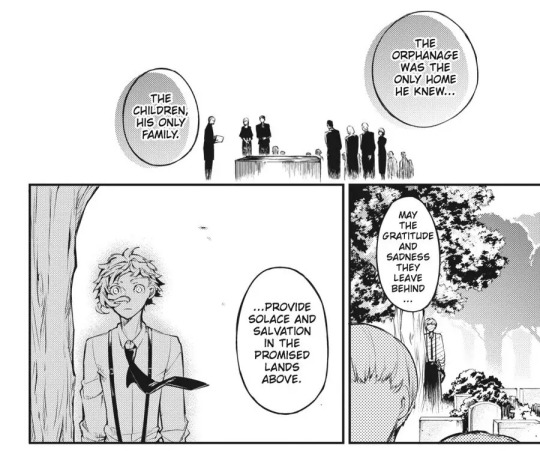
Chapter 39 reflects my points the most, and at the same time, it also turns out to be one of the most controversial chapters. It surprised me that it is, but maybe I shouldn’t be considering how most people on the internet act about abuse. It’s a lovely chapter to me personally and one of my favorites.
If you need a refresher, this is the chapter the Orphanage Director died in and leaves Atsushi in an emotional frenzy about what to think and believe. I know that the underlying message of this chapter is confusing to some, but it hit me in the face point blank on how this is about facing your abuser’s death without any personal conclusion with them.
Being sent on an investigation, Atsushi, after finding out the body was the Director, is stunned and scared because he knows nothing of the director other than his cruelty. He immediately assumes the worst and that he was coming after him again. Atsushi’s thoughts against him are entirely… on purpose in the director’s intentions because we find out that he has gone through so much violence and loss himself that he’s projecting his own will onto Atsushi and making sure he’d “survive in the real world”. So he became his first figure of hate and violence earlier in his life so he’d be “prepared for what comes next”.
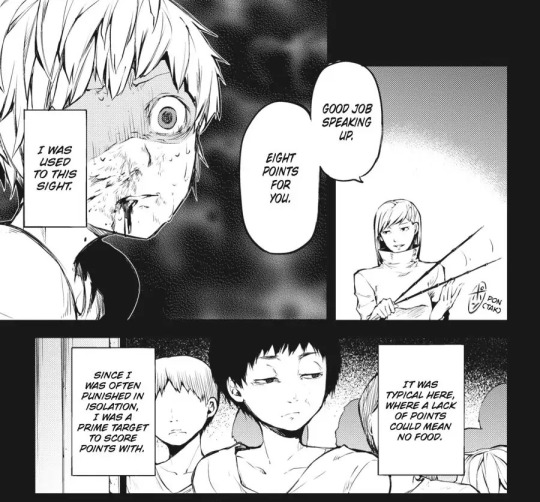
I know so many take the backstory for the director as a way to justify what he did to Atsushi in the narrative, but it was just to put into context why he was so cruel. Abusers are never cruel for no reason, that never makes it right, but it’s reality. Atsushi was not the only one in the orphanage who was treated badly, he was singled out by the director most likely for an ability he couldn't control because the headmaster knew he’d get the most trouble for it, and unfortunately… he was right.
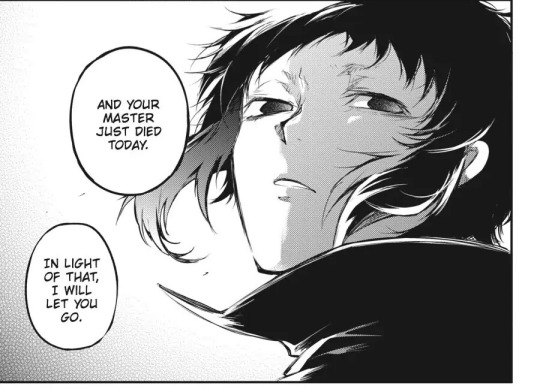
Akutagawa being his informant in this chapter makes perfect sense. He can see that what the director was for Atsushi is what Dazai is for him. No matter how terrible their actions were, it’s what kept them alive for so long. It’s not pleasant to confront, is it? Atsushi agrees because when he gets the information that the Director was going to congratulate him with the flowers he was going to buy by selling the gun he had on him, he freaks out. No way the guy he was raised so long to hate, the guy who put him through so much suffering, was going to congratulate him.
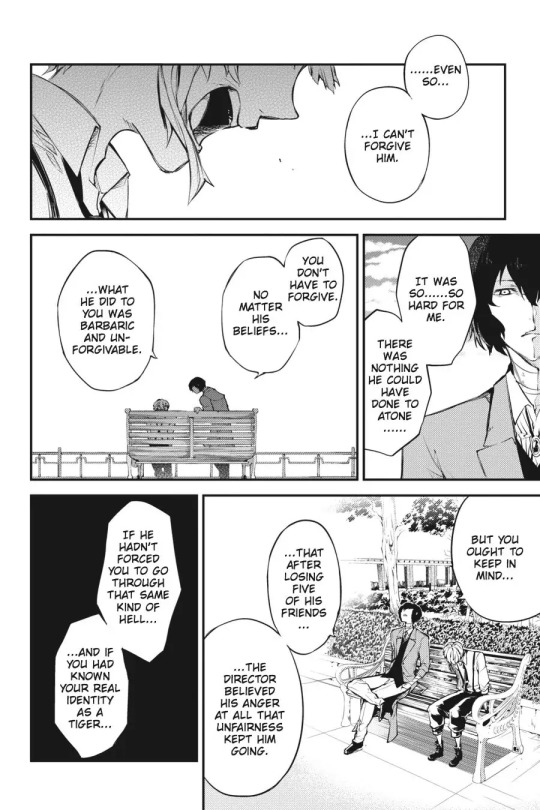
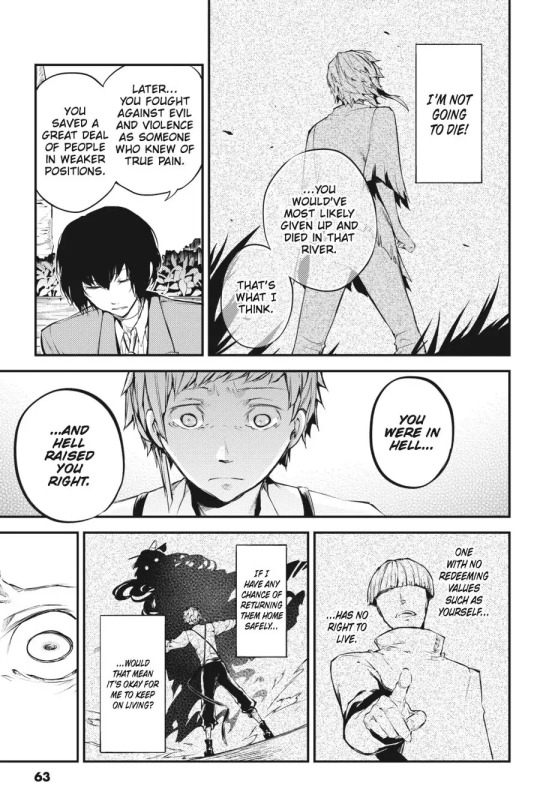
I know to some, Dazai’s talk with Atsushi sounded like he was justifying what happened because “it made him a good person in the end”, but that’s not what’s being said. This conclusion I’ve seen some people come to about this conversation confuses me. Dazai is just saying the obvious, you guys get all shocked and it weirds me out how easily it’s been glossed over that the reason Atsushi is so self-sacrificial and trying to do the good thing is because of the director. The reason he puts himself so much on the front lines is because he needs that worth in being good to live and prove the director wrong, he was raised to see that type of person is the most ideal person to live in this world.
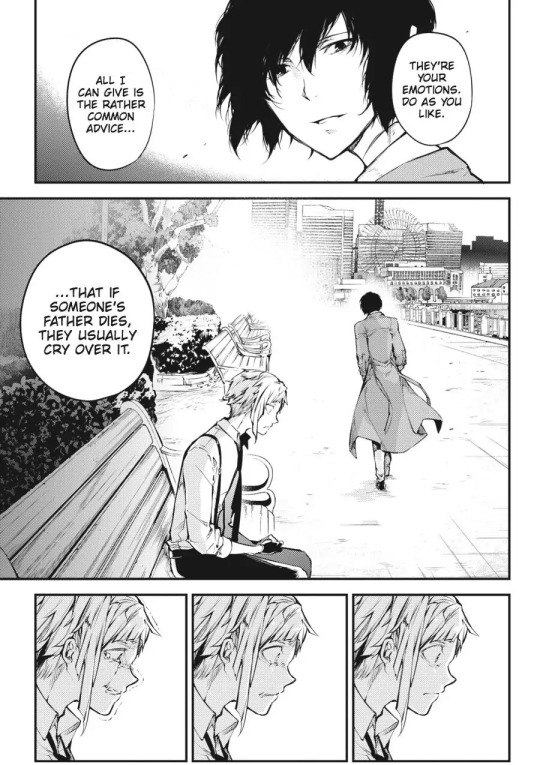
After everything that’s been dumped onto him in such a short time, so much inner conflict of what to think of a dead man he no longer can have any personal closure with, he asks Dazai what face he should make, what he should think at this moment. Dazai tells him that they’re his emotions and he can think however he’d like, but commonly someone cries when their father dies. So he cries, because ultimately no matter his treatment, no matter the intent and its effects, it’s still the man who raised him. It’s flawed, but that’s what a father is stripped bare at its core definition and that won’t change no matter your feelings.
Now that I’m done summarizing this chapter and making sure you guys understood the point and how it spells out their relationship, I can finally talk freely about what was happening between them. When it comes to familial abuse, generational trauma is so prevalent it’s hard not to talk about. The director is quite reflective of so many parents who were raised to grow up too early in harsh environments, that they think they need to prepare their children for it too, even though it’s no longer needed.
You don’t need to like someone for them to be important to you, especially if it’s a parent in your life or someone close to that. That’s why Atsushi cries. He cries for the director, he cries for himself, he cries that it’s finally over, he cries for the kindness he could’ve gotten even if it wouldn’t have fixed anything, he cries for the father that never was, he cries because his father is dead. It’s perfectly normal to keep someone close in your heart that wasn’t perfect and to grieve their death.
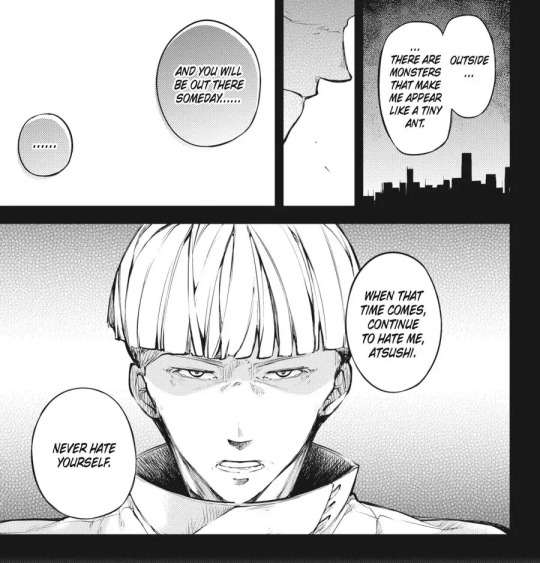
Was the director successful in what he was aiming for? I want to say no, but he did. He succeeded in making Atsushi think of others in a good light and do good for them, making Atsushi resent him, and giving him the ability to keep going. Hell raised him right, but it was still hell. The problem is that his teachings were based on degrading Atsushi into being nothing but a life he should put aside in favor of others. Even if he continued hating the director like he wanted, he would still degrade himself for being a coward who didn’t hold himself to those standards. The result is not perfect because the director is not perfect, but in his position, this is a success.
The director for a while was his shadow of negative encouragement when he joined the agency, what kept him going in those moments, because he was what defined good, bad, and justice for him in his entire childhood. Even if he was dead, he’d still linger in his mind. I can’t parse out what to think about these hallucinations forming Akutagawa and Dazai to guide him later on, all it tells me is that he still can’t rely on or trust himself and he needs more development in his self-image issues.
I see why fans are confused, hell raising us right is a bizarre thing to say to a victim, so let me show you a perspective you're not seeing. Let's imagine you have an abusive mother who only wants you to be prepared for the things you're undoubtedly going to experience because of what you can't control. What she did does help you, but all that goes through your head is “Why couldn't she have done it differently without my own suffering?” The only thoughts that come rushing back when you think of those memories are the unnecessary pains. It takes a lot for a victim to acknowledge this on their own, they want to push back at the past so they don't have to see this plain reality.
Like anyone else that I’m going to bring up in this post, just because the abuse made them who they are or affected who they became, even when it keeps us going through life and benefits us in some way, does not make the abuse justified. Abuse is still abuse, I addressed this already and I hope not to address this again. I needed to detail an explanation because it’s quite easy to hate a man you know nothing about and has been painted in nothing but a bad light. The anger against the director is undebatable because abuse is not debatable, but to pretend the cruelty was nothing but for cruelty’s sake is mischaracterizing both him and Atsushi.
You can’t pick and choose what’s been told to you in the text just because you don’t like a character and lack the maturity for it. It gets quite hard to do that sort of thing when it’s a character you‘ve grown to care about, it’s no wonder Dazai is divided between so many. Speaking of Dazai, his involvement in this makes as much sense as Akutagawa’s. He’s currently in a mentor position for Atsushi, no matter what Akutagawa says, and shows interest in his development. So of course he’s going to purposely stick his head into something that would affect Atsushi greatly. Both Akutagawa and Dazai are viewing this through their lenses as people who grew up in the darkness of society, and it’s not that Dazai thinks what happened to him wasn’t terrible, you should have eyes to read the panels provided, but he’s generally unfazed and able to sound neutral because he’s used to that cruelty.
The Port Mafia’s Environment
(Aka: is it really “all Mori’s fault” or is it just the product of being literally in The Mafia™?)
I’ll go over the “Cycle of Abuse” in a second, but please keep in mind that you can’t just blame everything on Mori. Just like the Director, it’s so easy to pin the guy who’s just been the worst for every problem there, but it decimates the other characters involved as well and makes what they’ve gone through go flat because you’re restricting it to a misinformed presumption.
To make a bold statement, I need you to completely throw away your idea of what the abuse cycle is. The Mori to Kyouka pipeline being the singular “Abuse Cycle”? Garbage, needs to go away too. I've seen many fans use the term “Cycle of Abuse” too carelessly, and while from afar the way they're using it is not technically wrong, they have the wrong thought process behind it.
The Cycle of Abuse is simply the patterns of what keeps us in an abusive dynamic and negative mental state, either with an individual or environment, and makes it incredibly hard for anyone to leave. It’s not the actions you take that make it the Cycle of Abuse, and it's not just one straight line of people going through similar motions. You don’t have to be someone’s abuser to be the one who keeps them there, if you feed into it you’re still a problem. Even if you don't actively add to it yourself, just staying there as a bystander and not trying to do anything to change it or speak up for the victim when you clearly could also still make you responsible. Just with your presence, it validates what they've gone through as normal.
If you need more of an explanation, two opposite examples include Higuchi & Akutagawa and Beast Kyouka & Atsushi. Higuchi is a traditional example in that she stays in the mafia because of her relationship with Akutagawa, and stays by his side for reasons unknown. What we do know is that she’s incredibly indebted to him enough to care for him to an extreme extent, but their relationship is abusive all the same. Beast Atsushi and Kyouka sounds strange for me to bring up, but this is an example of a non-abusive person contributing to the Cycle of Abuse. Instead of taking her out of an abusive situation, he brings her back in.
Many characters are a part of this main narrative of abuse in BSD, so it's not inaccurate to say Mori, Dazai, Akutagawa, and Kyouka are a part of it as well using this definition as all of them are the reason or contributed to why someone was stuck in a negative, abusive situation or the victim themselves. I’m guessing none of you are genuinely referring to this though and are referring to intergenerational abuse, a repeating cycle of younger generations taking after their abusers when they're older, which is a completely different phenomenon. Both are referred to as cycles and have many commonalities, but it’s not the same. Not to sound like a total dick, but this barely even applies to them.
Not because the concept is based on familial relationships, it can happen with older figures in your life too, but because our oh-so-famous Abuse Cycle gang does not have that commonality to make that claim. They have narrative parallels, but that’s pretty much it. I will save what I have to say in their sections, but Mori and Akutagawa did not abuse Dazai and Kyouka respectively for this type of claim to have any legitimacy. Kyouka certainly broke a cycle, but not that kind since that would need her to continue it in the first place and then prevent her own experiences from even affecting the next child.
What do all Mori, Dazai, Akutagawa, and Kyouka actually have in common? They are/were in the mafia, using their natural talents of cruelty for the underworld.
The Port Mafia resembles something of an abusive household or community that sees so much of what’s done to others there as normal, and constantly compares it to how it was with their old boss and thinks, “At least it wasn’t as bad as that.” It’s quite like the Orphanage Director’s thinking but on a larger scale. Does that make everyone in the Port Mafia abused? Nope, unlike most abusive communities, the Port Mafia is quite literally the mafia. Everyone is there for different reasons, at different ages, and different experiences. Everyone is taken advantage of in these situations, no matter the circumstances, but it doesn’t make them abused automatically.
So it’s hard to have a stance on anything about them being abusive other than the mentor situations in the Port Mafia don’t see abuse as abuse and just another way to teach their subordinates to survive in their world if they deem it necessary. Was Chuuya abused, either by Mori or Kouyou then? I’m going to have to say I can’t tell you that. We don’t have enough information on either of his dynamics with them to say that they’ve directly had any repetitive behaviors of direct harm against him specifically, and there's no reason for them to do so either. I’m not going to use the argument that “Chuuya doesn’t hate or fear them, so that must mean he wasn’t” because again, that type of response does not reflect so many situations.
Chuuya was still harmed by being in the Port Mafia as a teenager because nobody should have been surrounded by this much cruelty at that age. It doesn’t matter if he shows visible distress or not about the Port Mafia, he was just desensitized to it since his sheep days. So was he an abuse victim under the idea that being a child in the Port Mafia is abuse? That depends on who we’re speaking of, but in Chuuya’s situation, I'm going to have to say no as he's already internalized their mindset from his own experiences separate from the mafia. Keep in mind that it also still holds true that you can find family in situations like this, it’s not mutually exclusive. Some just find more comfort in what they’re used to than what would be better for them. Kyouka is a better example of someone being a victim of an abusive community.
A false claim I've seen made many times are the ones where they have it as if Mori is the mafia itself or that he made the mafia what it was. It shouldn’t be too surprising, but it’s the opposite. Mori already held flawed, heartless, calculative methods when in situations he thought required them. We’ve seen him as a soldier and an underground doctor, but we know nothing else about him outside of his cruelty, just like the headmaster. What he does is never for what he thinks is for his benefit, but for the sake of something larger. Whether it’s for the city, the country, or eventually, the Port Mafia.
The mafia is the first time he’s been put into a position of absolute leadership and is not yet accustomed to that at the beginning of Dazai, Chuuya, Age Fifteen. He’s able to quickly fit the mold of a mafia boss, but there’s that bit of honesty that peaks through in this light novel in the first and last sections that’s ignored too quickly. First Mori complains about nothing going immediately right, questions himself about Dazai, and becomes genuinely stressed if it was the right decision to involve him, then confesses that he sees himself in Dazai to him (and him and Fukuzawa in Soukoku in private), and finally gives his honest take of leadership to Chuuya.
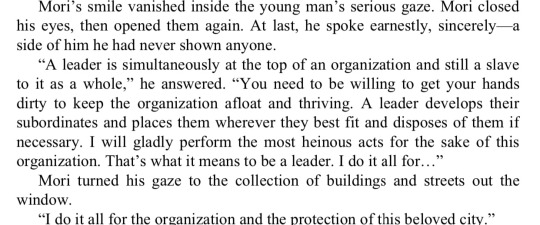
I already go over Mori as a character in one of my other posts and will speak more of him later on, so I don’t want to reiterate the same points, but here we have proof he has (albeit poor) humanity. He did not become the Port Mafia boss for his own selfish gain of power if you’ve forgotten, but because Natsume introduced him to becoming part of the Tripartite Framework to protect the city he loves, it’s where he’d excel best in this plan. The Port Mafia was already a shithole, Mori just made it livable again by becoming what an organized crime group needs.
It’s what makes the dynamic between Kouyou and him so intriguing because you have an abuse victim who has embraced the environment she was forced back into, but won’t let go of someone who’s proven to be more of a decent leader than her tormentor and can be relied on. For victims who couldn’t get help or realize they needed help, the easier path is to accept this is your life through some justification. While I said the Port Mafia resembles an abusive community, communities as such aren’t purely terrible and that’s what keeps them justifying it in their head. The family you have for yourself, whether it's a made one or the one you're born with, is what sticks for you.
Like it or not, Mori isn’t stupid. He takes risky gambles that backfire on him sometimes, but he’s good at his job. He’s brutal enough to prove his own against the people who didn’t think he should’ve been boss and outsiders who want to go against the Port Mafia, but he’s considerate enough towards his people and shows enough competency to be perfect for the job. He’s not a great human being, but what did you expect? He no longer had any room to express that humanity, he never had; there was no benefit from being a good person in his line of work.
The Heartless Cur
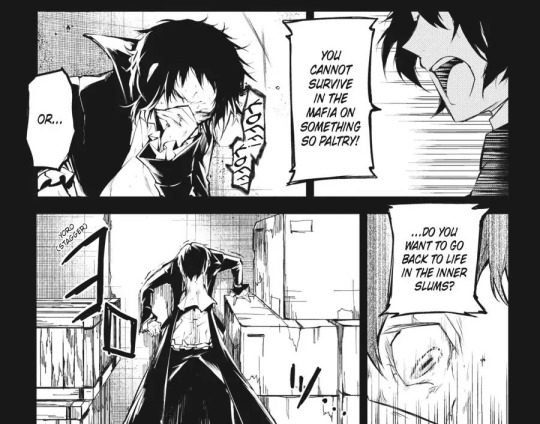
That looked like a great segue to talk about Dazai and Mori’s dynamic, but it’d benefit to go over Akutagawa first. For those who do acknowledge it as an abusive situation, Thank you for at least taking that step. Numerous don’t and it worries me at the state of what’s considered abuse vs. training. It may be both at times but don't excuse one for the other. Training needs formal consent and communication at some point during a session. Akutagawa is learning, but it’s the same as getting yelled at as a child for not doing your homework right, when again, you’re still just learning.
It might’ve been easier to see for those who do acknowledge it because of the visible physical abuse that happens, but let's not undermine the psychological abuse happening as well. Dazai has messed with his psyche on an abhorrent level through his degrading and threats, making him reliant to hear a single word of acknowledgment from his mouth. What happened to Akutagawa is beyond the mafia’s environment.
Akutagawa does not hate or want Dazai dead for what he’s done to him, but he does hold anger at the seeming abandonment he’s been put through… and at himself as well. Anger that he couldn't get to what Dazai wanted him to be before he suddenly left. So he proves himself by climbing the ranks and becoming someone feared. Spectacles of violence not because he enjoys the feeling of other’s suffering or the power over them, but to show Dazai that see? He's still worth looking at!
He stays in the mafia because he’s found a place there. Even if he could, there was no point in leaving the mafia after he disappeared because what would be left for him if he did? He will always be an unchangeable, horrific hound of the dark and there's no changing that in his mind. From an inference of his actions in the dungeon when they finally reunite one-on-one, he wanted to believe that he was above Dazai after all those years, but Dazai doesn't act impressed or scared or anything. After all that effort, he gets nothing but ridicule and mockery like he's back to being that little kid with an oversized coat too big for his body.
Worse is that he gets told that some new kid Dazai picked up, who didn't train to the extent he did to refine his abilities, is better than him somehow. He gets riled up and at first, takes out on Dazai, but all those threats about killing him and how he went against the mafia were empty. Even now he can't bring himself to hate Dazai, he needs his mentor to acknowledge him no matter what side he's on. He never let go of Dazai, his coat is proof enough of that. So he takes it out on the party that isn't responsible and is convinced he needs to overcome Atsushi to prove something to Dazai.
He doesn't hate Atsushi, not genuinely. He does the same when he’s told he’ll never compare to Odasaku, someone who objectively should’ve been the weakest member due to his status. He gets angry at Dazai’s words, gets angry at himself, then takes it out on the person mentioned, rinse and repeat. I’m not sure if I’m the only one to notice, but he genuinely believed that the meaningful life Dazai gave him laid in the mafia and being useful to its cause. He has no reason to be as loyal to the mafia if he didn't think this.
Dazai’s acknowledgment means more than just appreciation for his skills and strength, it means his life meant something by striving for being the strongest. It’s not about the acknowledgment at all. Whenever he critiques and shames Atsushi for how he lives his life, it just feels like he’s unknowingly shaming himself through him without having to acknowledge his wrongs. It makes me curious about how much the acknowledgment itself even matters to him and the validation it gives him to strive for this is an excuse to keep living so what he’s doing in the mafia even matters in the end. What counts as acknowledgment to him?
He's convinced his faults are what made Dazai turn away, he just doesn’t know how to do anything to fix it and can't fix it this late into the game. What does Dazai want from him other than being stronger? When Dazai directly asks him to do something important involving Atsushi, he’s confused. He has no reason to trust him to do these missions. He’ll take the chance to prove himself once and for all, but to be included means he's being acknowledged, so what gives? The number of times he visibly self-reflects can be counted on one hand because as soon as it shows, he goes back to justify his violence and ignores his faults.
As someone whose favorite character is Akutagawa, I’m disgusted that all people can take away from him is “Akutagawa is an obsessive fanboy that deserves no sympathy because of what he did to Kyouka” or “Akutagawa is a poor, miserable man that didn’t deserve what Dazai made him into and should be absolved of responsibility because it’s all Dazai’s fault”. Both are very shallow and very harmful to perpetrate as they continue the idea that a person can only be the abused or abuser. He's both and it's okay to admit that.
Quickly let’s clear up this: He is not the way he is because of Dazai.
What Dazai IS responsible for:
Akutagawa’s need for his constant approval and recognition
Akutagawa learning to hone his ability
Akutagawa’s toxic views of being useful
The reason Akutagawa’s still alive
The reason Akutagawa is the Mafia’s dog
What Dazai is NOT responsible for:
Everything else
Akutagawa’s lean toward violence, his one-track stubborn mindset, and his lone-wolf attitude are not a product of Dazai’s treatment, he’s always been that way because of his time in the slums. He got beaten down by adults frightened of his empty gaze, had to learn to protect himself and find something to eat to survive, helped take care of his sister Gin and his friends by himself, and everyone constantly dying around him. That’s the real reason his personality is like that. He is a victim of his circumstances in a society that deemed him worthless, so he also thinks of his life as worthless. That’s why Dazai means so much to him.
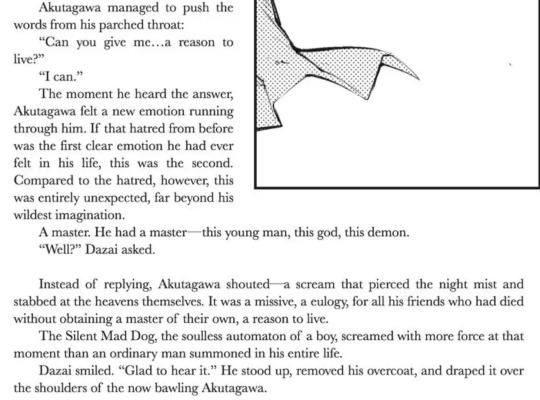
Dazai did not trick him into joining the mafia, Dazai expressed what he was going to go through was worse than what happened in the slums and gave Akutagawa an out that he could live a normal life with enough money, but he knew Akutagawa would not refuse because he still needed meaning in living, just like him. Gaining enough money to get by so he and his sister could get out of the slums would do nothing for him, he already felt that his life was worthless. He has no problem throwing it away at any time, he was gonna die young regardless because of his lung disease. It has manipulative undertones, but that's how Dazai usually is with even the people he cares about.
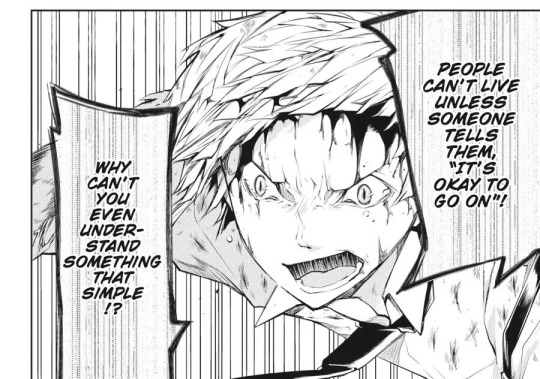
Akutagawa knows too well that a person needs a sign, someone to tell them it’s okay to keep going, and so does Dazai. Part of Dazai’s goal is to save Akutagawa from dying and give him a reason to live like he promised that day because he sees the potential that could come from his development. I don't want to sound like a dick again, but you’d have to be dense to think Akutagawa would still be dead by the end of this arc. He isn’t sending him off to his death, Dazai doesn’t know everything.
Even if he knew Akutagawa might die there, it's better than both Atsushi and Akutagawa dying at that moment. If Akutagawa didn’t want to die for him, he wouldn’t have, he chose to save Atsushi’s life. This is why I have to defend Asagiri. Let’s reread the interview together, to make it get across already.
(Twt link)
Q: Just like how Akutagawa and Atsushi's relationship has changed, I could feel the relationship between Dazai and Akutagawa moving forward too. Is it like what Akutagawa has said in Episode 3 of Season 5, that every order he has received from Dazai so far has been "a trial", "a part of a meaningfull life"?
First, the question being asked. They’re asking Asagiri about their relationship in the present, and how it’s developed. Akutagawa is no longer thinking he was abandoned by Dazai for a new, better student like he was made him believe, that was just to rile him up and interact with Atsushi more. Instead, he realizes that he’s not supposed to work against Atsushi, he’s supposed to work with him. How he decides to go about that battle with Fukuchi and whether or not he works with Atsushi like a partner is his trial. If this was Akutagawa before he met Atsushi, he would’ve no doubt escaped or might’ve thought defeating Fukuchi would prove himself to Dazai. He's not an obstacle to his meaningful life, his quest for a meaningful life lies with Atsushi.
Asagiri responds with:
Asagiri: Needless to say, Dazai is the most qualified person in this world to help Akutagawa grow. Dazai has a vision for Akutagawa's development, and he completely understands what it takes to achieve it. We, as obsevers, can only see bits and pieces of that vision. But I can at least say that Dazai's training plan has never been wrong.
Many find this answer questionable, I was stunned reading it myself. Asagiri is not wrong at all here though, Dazai is objectively the only person in this series who can find a way to help him. Atsushi is the endpoint, but Dazai has been guiding him to this point. Dazai himself said that he was planning to team them up the moment he met Atsushi, he was still thinking of him even after all these years. There are much scarier implications than thinking that Asagiri was wrong. It's that Dazai was doing everything intentionally to get Akutagawa’s mindset where it was. He didn't mess up with Akutagawa, he just couldn't personally teach him the skills he needed and chose a different route until he found something that could.
Asagiri is not saying the abuse was morally justified, but the intention behind it was not wrong in an objective stance. Dazai would know what to do the most because of his understanding of wanting to find meaning in living. Teenage Dazai couldn’t have achieved much by himself, even if he could understand since he also could not find meaning in life. That’s why he made him hang on to his every breath of validation so he would keep his faith in Dazai long enough for him to find a solution to this dilemma. The moment in life when he found Akutagawa was not ideal and he still did what he thought he had to do for him to survive in the mafia. Without his ability, he's incredibly weak and needs to be able to defend himself. A violent person could not have made another violent person unlearn their violence.
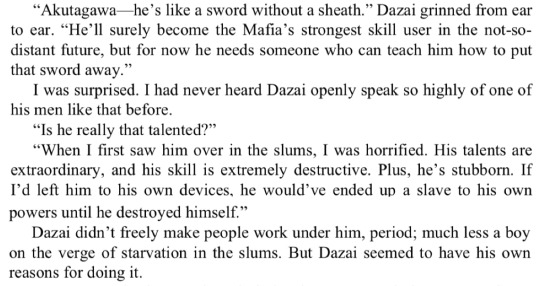
You could say he just wanted a weapon, but that’s not it, not even close. Many of you are stuck on the part that it was a suicidal teenager that picked Akutagawa up from the slums and that no way someone like that could teach another suicidal teenager anything, so it’s “comical that Asagiri thinks as though he’s the most qualified”. You’re not wrong in some sense, but this is still incredibly intelligent, “Black Wrath of the Port Mafia”, Osamu Dazai, and not just some suicidal teenager.
He’s also no longer a teenager. Right now we’re talking of Dazai in the present who’s grown and no longer needs to be how he was in the mafia, he has Atsushi now, someone who can help Akutagawa see what’s wrong in his outlook. The only thing he could’ve done back then was to shelter Akutagawa so he wouldn’t kill himself. It's horrible, but Dazai validating where he is now would do no good for either of them and fix nothing.
Q: What kind of person is Dazai to Akutagawa?
Asagiri: Actually, at the time of "The Dark Era", Dazai already spoke very highly of Akutagawa, as someone who would "become the Mafia's strongest skill user in the not-so-distant future". He just doesn't say that in front of Akutagawa himself. The reason he doesn't say it is that Dazai has to be "the presence that continues to give meaning to life" to Akutagawa. So far, that trial has been completely successful.
None of what Asagiri brings up is new information. He doesn’t say it in front of Akutagawa not to spite him, but if he gives these praises out too freely, he loses his distant, almost god-like presence in Akutagawa and will go back to being just a lone wolf with no exceptions that will carelessly get himself killed. Without any goal, he’s lost. Just like Atsushi and the headmaster and how Atsushi hinges on proving he can do a good thing to motivate his life, Akutagawa similarly hinges on the fact that if he fails, he won’t get Dazai’s approval.
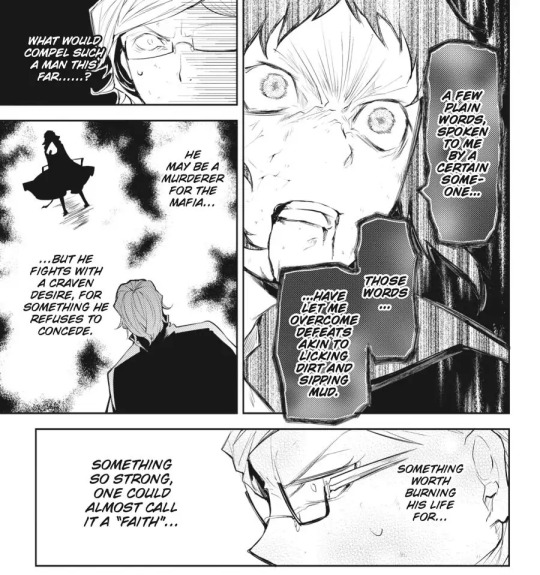
However, his death was not fully about Dazai’s approval in the way he's been preaching. In chapter 87, he mentions Dazai’s approval like always, and when they fail the first time even after trusting and working with each other as Shin Soukoku should, It hits him. What came into his head I cannot parse out at the moment, but his actions speak so much louder than any explanation we could've gotten. Of course, he's helping Atsushi escape, but what does he do for that? He used his ability on his shirt, and not just on the coat like he typically does.
It doesn't seem like a big deal at first, he could've always done that, but when was the last time he used it on something that wasn't the coat Dazai gave him? The coat means many things. His new beginning, his path in being Dazai’s student and successor (as that was also Mori’s coat), but it also conveys Dazai’s will that keeps him alive and that he's only strong with his coat. Without it, he's defenseless, so he clings to this coat the exact way he clings to those orders. It's his encouragement to keep going when Dazai isn't there. This overwhelming, suffocating responsibility, an oversized coat, is a lot to give to a kid but it's comfortable and he’ll grow into it eventually.
It was already a huge step in his development that he gave Atsushi his coat, but to use his ability not on his coat means he's making an effort to overcome his fixation and do an action unrelated to Dazai for the sake of Atsushi’s life. His whole life after the slums, everything he's ever done was with Dazai in mind. Him saving Atsushi’s life was not because he was doing what Dazai wanted him to do, that he'd finally get approval for doing It, and in turn give his life meaning before he died. When he saved Atsushi, it would give his life meaning in just that. He shouldn't let himself be defined by the past the way he criticizes Atsushi for, so he’s going to choose his meaning. I wouldn't say he's moved past Dazai yet, but he's getting there.
Dazai and Akutagawa’s relationship is not healthy in the slightest, and Dazai’s crueler actions and words against him are not right, but they’re still growing and not stagnant characters. Atsushi and Akutagawa learn from each other and that's what's pushing them to change. Nobody will pretend those past means weren’t just abuse, they were, but there's so much more to it. Like I asked with the director, was he successful? Well from what I’ve said, yes it so far has gone the way Dazai hoped for in the best-case scenario.
In the main universe at least, this is one of the better ways it could’ve gone. Beast is a different story. Teenage Dazai of the main universe was unsure of Akutagawa’s future and did only what he could’ve done at that time, but Beast Dazai does have that knowledge and he decided that it would be best for Akutagawa to not be in the mafia, instead bringing in Atsushi. It wouldn’t have been good to let him pursue his violent tendencies more than necessary in the mafia in this universe when he knew there was a better option, especially with someone like Oda, who would take the time to care for him properly.
Even if he didn’t bring him in, he still gave him the motivation to keep living for something. The prologue of Beast is a mirror to The Heartless Cur, with instead it’s a distant relationship of hate Akutagawa has for him for taking his sister. For those who argue that since Beast exists, that means Asagiri was somehow “wrong about Dazai”, but it’s still Dazai from the beginning that’s the source of this motivation. Dazai, who's still guiding him. If we’re gonna be honest, Dazai was putting their development/capabilities in speed run mode with the logic and future information he had access to prepare them for a timeline he won’t be alive for. There are many factors for what he did in Besst, but that’s not the conversation.
What does he get from helping him? Who knows, Asagiri wasn’t being cheeky when he said we only see bits and pieces of his vision. We barely have any clue what’s going through that man’s head, so don’t act like you do. He wasn’t always planning for the next Soukoku. Maybe it was a thought that came up sometimes, but he’s only met Atsushi recently. What about Akutagawa was so different from any other powerful ability-wielding orphan? Well, we’re not gonna know any time soon.
The point is that Dazai is thinking about their future, even if the abuse or manipulation makes that hard to see. Please do remember that abuse is still selfish no matter the intention, but non-selfish intentions make it all the more complicated to process. Their relationship is not misunderstood by Asagiri himself, it’s just clear to me most don’t want to face the unpleasant truth that there is more to their dynamic. When I first realized what was going on, I couldn’t help but get unnerved and awkward when someone would ask me about these two. These are both characters in the spotlight that you’re supposed to care about, but what happened between them is rotten.
You’re not supposed to pretend it didn’t happen because Dazai still contributed to who he is and it shows whenever it’s on screen. Abuse doesn’t make us stronger, don’t make it as if that’s a message that Asagiri is spreading. What happened to him motivated his development, but with Atsushi, that’s the opposite. Their circumstances are different and victims process what's happened to them in various ways. Depicting it in a form less common than usual doesn't mean the author thinks in the same way the victim does, it's just nuance at work.
I did not add Akutagawa’s attitude towards his subordinates and newer members as Dazai’s responsibility because Dazai is not the one controlling his hands when he hits Higuchi. Dazai’s mentoring contributed to his toxic views of being useful, but it’s only Akutagawa’s responsibility once he raises his hand. Instead of thinking of this in the context of the most typical abusive situation you can think of, how about this:
Your parent was raised in an abusive household, but they think they came out of it just fine and that there was nothing wrong with how they were treated. They treat you almost the same way, and all you can take away from that when you find out is, “At least it’s not as bad as it could’ve been”. You still hold anger at the standards they’re forcing you to reach, but if that’s what it takes to get that approval, then you’ll keep going anyway. Even if you get yelled at and you know you shouldn’t be treated like this, it’ll feel nice when you finally get on their good graces, right?
Then you get a new sibling, and all of that comes crumbling down. They don’t treat your sibling anywhere near the same when you were that age. Years go by and you get angrier and angrier. Why is it only you that was put to that standard? Even worse is that they treat you differently now too. You finally got to those standards, but now what is it worth? They’re so much nicer now and you want to curse them out for only changing now. Why couldn’t have had that parent from the beginning? It’s so unfair, but you can’t take it out on them because you still need them, they mean so much to you. As angry as you were, they were doing it because they cared about you in their way, you think. It was what your grandparents did to them at least. So you start treating your sibling similarly to how you were treated because you can’t take it that they didn’t experience that hardship without destroying yourself first.
Question: Are you right in what you did? Was the parent responsible for what you did to your sibling?
Nobody in their right mind would say yes to that first question. It makes sense why it happened, but continuing abuse will never be the correct answer. You’re doing the same thing your parent did. The second question needs more exposition to answer, however. How responsible is responsible?
In the end, even if it was the parent who influenced it, you’re only responsible for what you’ve done on your own accord. The parent did not tell you to take it out on your sibling, you decided that yourself. The parent is still responsible for what they’ve done to you, never get that wrong, but if you say that your guilt is absolved because it’s all their fault, you sound no different from any other abuser in denial. Are you saying now that the parent is also absolved from guilt because it’s all their parent’s fault too? Listen to yourself, You hurt someone but it’s not your fault, but the person who hurt you is also somehow not at fault? If someone came up to you and said that, you’d be fed up.
For those who do the same thing with Mori, rethink what you’re saying. Is it that painful to admit your favorite characters are at fault and that they’re changing? This comparison isn’t perfect and ignores some key factors: Dazai isn’t Akutagawa’s or Atsushi’s father and is not much older than them, the Port Mafia is a violent workplace environment and requires you to be able to navigate it a certain way, and all three of them at adults in present time. I used this comparison to be more real to earth and something a larger audience could process themselves to truly get that the emotions here are not straightforward even in a realistic situation.
Re: Portrait of a Father

Just like the prologue, in chapter 3 of the Beast light novel, Portrait of a Father is mirrored and retold in brutal upset that does not hold the hopeful bittersweetness at the end of it unlike its original. Before the present day, against all orders Dazai gave him, Atsushi attacked the orphanage on the day of his birthday. On his birthday, he would be reborn from the ashes of his past being burnt away, and kill the director inside to release himself from the fear of those memories.
It’s what he says at least.
Playing out, the director was expecting him. There might have only been one person in his mind who would’ve attacked a rundown orphanage on this scale. It frightens Atsushi after all that planning and fear of losing to the director, he could still see through him, but confusion takes hold when he’s told that he was late for his graduation.
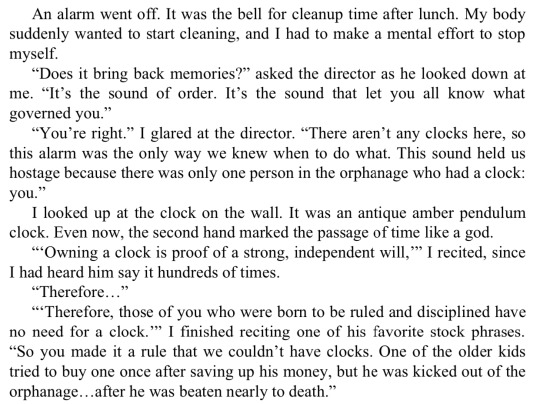
Graduation? Atsushi is in fight or flight mode, why is he approaching him with this box? He can’t imagine it being anything other than a weapon, nothing else would make sense for this cruel monster. The director won’t give him any straight answer, just repeating words he’s heard over and over growing up here. He uses his tiger hearing to glean what could be inside.
Tick. Tock. Tick. Tock.
There’s the proof, it had to be a bomb. He needs to protect himself before anything happens or he’ll die. He’s scared, he can’t move, but he has to fight. The director opens his arms for the embrace of his child… and death, plummeted into a bloody mess on the floor. Only out of the corner of his eye, only when Atsushi stopped, he saw what was in the box. It was a watch, brand new and high-end. Happy Birthday was what was written on a sheet of paper next to it.
His last words, whispered into his ear, were words of encouragement: “Yes… just like that.”

I was not kidding when I said this was brutal. Just like in the main universe, Atsushi learns why he did what he did and can’t place any of his feelings, but overwhelmingly guilt crushes him to keep protecting people with his life rather than just fear because he killed him. He finds out much earlier about what happened with Shibusawa, and how the director protected his identity as the tiger.
The director’s intentions are draining when you let your mind wander. As we’ve established, the headmaster as a figure of hate for Atsushi is intentional on his part. He doesn’t explain anything on purpose here to probe him into killing him. He bought that watch for Atsushi as a congratulations for growing up and becoming a new independent individual.
In the split minute before Atsushi took the first swing, he said his usual, “Those who fail to protect others do not deserve to live.” I have to question now if he was so willing to die there, even encouraging him to kill him, then has it been this whole time he still can’t live with himself for what happened to his friends… or is it because he couldn’t protect Atsushi anymore? Maybe I’m overthinking it and it was just that the headmaster thought Atsushi needed to kill him to remove an obstacle in his growth as an individual, to be a necessary sacrifice for his benefit.
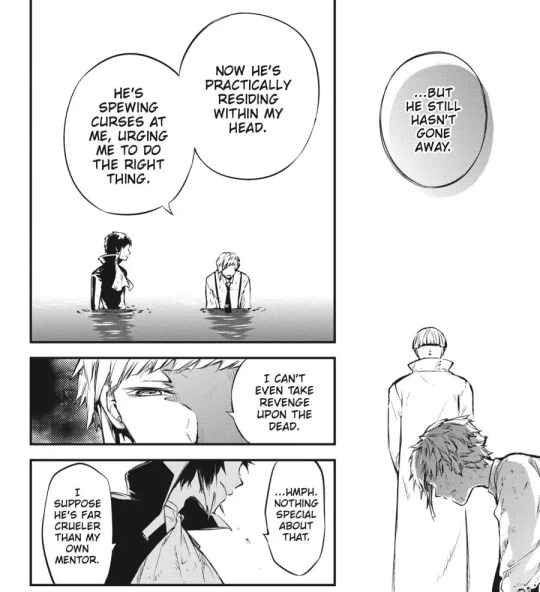
It's too flawed though. The director will never leave him, not after all that he's engraved into Atsushi. The watch has become not a symbol of a person who's found himself, but a child that's latched himself onto his father's cold corpse that won't ever respond, but that child would do anything to have him wake up and say "Good job, Atsushi". The director also has a clock, but can he call himself a strong individual when he hasn't let go of the past either?
Time stopped for Beast Atsushi when he picked up that watch. If he had just followed orders, none of this would’ve happened. If he isn’t his father’s child, if he doesn’t uphold his last wish, then who is he? When he’s no longer in the mafia and has time for himself to think, he wanders.
He failed in becoming someone he could be proud of, he deserved to die for that but doesn't want to be dead… because It wasn't truly about the Director, just like how it wasn't truly about Dazai’s acknowledgment or saving his sister for Akutagawa. At first, that was the motivation, it's the reasoning they keep going with, but in the end, it was to save their own life and give it purpose to validate why they're still around. If they can die like this, then it's all the same. If they have their own life in someone else’s hands, then they no longer have to be responsible for their own heavy-hearted weight.
Beast Atsushi is given neither and is taken of his reasoning, but he keeps going. Aimlessly.
Luckily, it’s not where his story ends.
He wakes up in his old orphanage, and it’s no longer the dreary place it was when he was younger. Kids laughing outside, no chains on the walls or bars blocking off the windows, and the new Orphanage Director greets him. He tells him that he will go back to being a student of the orphanage until he can become independent again, under one of Dazai’s last requests before he died.
Still, there’s one thing he needs to do. The new director takes out the watch and tells him to break it. Atsushi is distraught by this notion, but he won’t let Atsushi leave if he doesn’t. The new director has good reason, there is no point in becoming someone the past director was proud of and this is what’s holding him back. Atsushi, eventually, tells him he will not break the watch. He can’t move on just yet and this watch is still proof he’s himself, yet…
He’ll keep going and move forward, just like Akutagawa told him after he spared his life. The new director finds those words to be enough, saying he can’t leave until he finds something else to define himself with, but he can keep living here as his son. He went there to burn away his past and came out of it not able to let go of the past, but now he can redo and process it healthily with someone willing to hold him like a father should.
The Man Who Raised Dazai
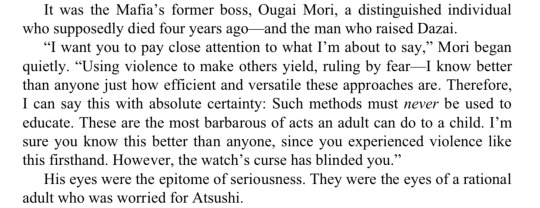
Everyone who’s read Beast has questioned it: Why did Dazai in his right mind have Mori take care of an orphanage? Why did he save his life? Better yet, why is he so nice?! I have come up with some speculation on why Dazai would.
“Beast Dazai recognized this potential of change either from the multitude of universes he was able to witness or recognized it in his own considering canonverse Dazai never does anything against Mori (even if he visibly dislikes him).”
“Possibility is one thing, the why is another. It was either that he saw potential and good that could come out of this in the long run, Mori’s intelligence and expertise still proves usefulness, less dangerous for Oda in the long run if he let Mori stay there instead of the Mafia, or all three.”
(Didn’t feel like rephrase them)
We can’t know anything for sure about his decision, but I do know Mori is the type of character to sacrifice his feelings for what he thinks would logically benefit the sum, and there’s no better way to release yourself from that too-calculative responsibility than to remove yourself from it and to be in a place where you’re allowed to care for others and express yourself when there is no greater purpose than to just grow.
What happened with Yosano is undoubtedly wrong, but Mori had put away any sympathy in those situations because he needed her to do what he brought her in for. I was confused by his declaration that violence should never be used to educate children when I read it, especially out of his mouth, but now I understand. He would know with certainty that it’s not the right way to educate children, particularly because this is a Mori that hasn’t been in the dark for these past years and has grown to care for these children at the orphanage without any greater intention for them.
He’s not like the Old Director because he has no reason to think these kids would end up the way he did. They’re just kids that need someone to raise them with kindness, kindness will be what gets them through life as functional adults. Abuse has too many drawbacks to be called an optimal solution here. Is it surprising that all it took to change Mori was the kindness and salvation Dazai offered to him when he took over? Can you believe it was that simple to treat someone like a human being instead of a figure of hate?

What sticks out to me like a sore thumb is that when he’s introduced in Beast, he’s referred to as the man who raised Dazai. He is, regardless of what you think, the closest thing Dazai has to a father figure. In regards to how the fanbase speaks of their relationship, it’s hard to think that he cared about Dazai, but he did and the extent of how bad it got between them is grossly exaggerated.
As many comparisons Dazai gets with Yosano, their relationship with Mori is very different. Unlike Yosano, he did not need to be forced to do anything with psychological abuse and he did not need to be torn down to do what Mori asked him to. We don’t know what happened to him to become like this, but it wasn’t because of Mori. Yosano had light in her and a motivation to do the right thing, but Dazai didn’t. Dazai is no stranger to any violence or using violence himself even before Mori if he's this desensitized.
It’s useful that Dazai is like that when he meets him, up until it isn’t. He’s moody and actively looking to die. Mori can’t predict him that easily and Dazai can see right through him. There’s another huge difference between them though: Mori sees himself in Dazai. We don’t have enough insight in his head to make conclusive statements, but I think this is why he cared for Dazai. It’s not because he saw a child struggling that he cared, but grew some fondness because he saw a little mini-him. When he drove Dazai out of the Port Mafia, he expected him to come back and take back his vacant seat.
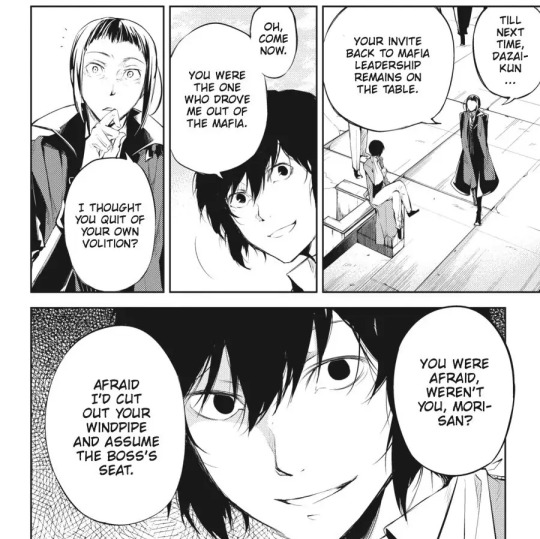
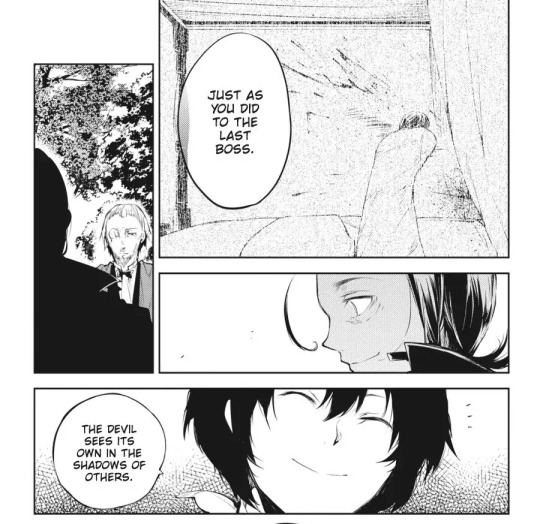
Eventually, Dazai will come back and realize that petty anger about someone dying is illogical in somewhere like the mafia. But because of him not being able to see through Dazai and seeing himself in him, he also expected him to eventually usurp his seat if he stayed any longer. That is why he had invited Mimic at the time he did and manipulated the situation so Oda, someone he knew Dazai cared for, would go and take care of the situation flawlessly. He’d be sacrificed and Mori could get something out of it, a Skilled Business Permit. A perfect plan… in theory, but Mori was wrong and miscalculated on many levels because of how many assumptions he made about Dazai.
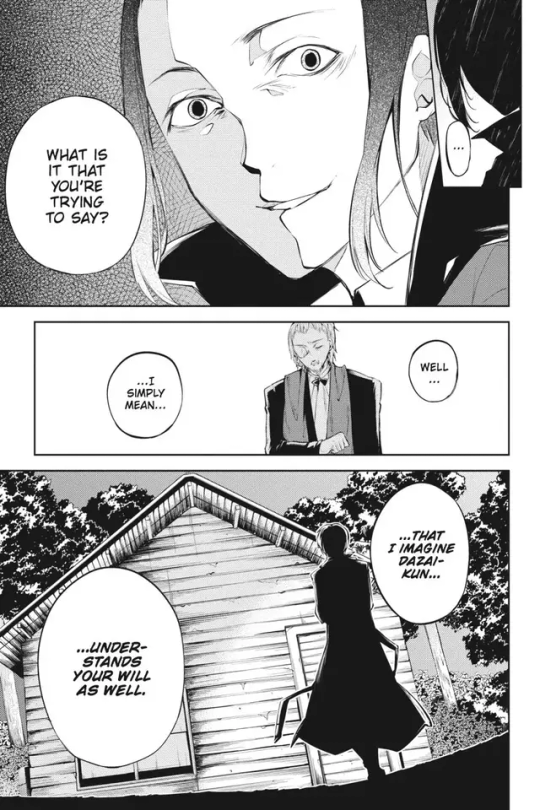
First, he wouldn’t have known that it was Oda who held the words that would convince him to leave the mafia and go into the world of light. Dazai will never come back to his own volition. Second, as those panels quite literally tell you, Dazai was never planning on killing him. He saw his place in the mafia and saw that he was needed there. When Mori finally realizes his mistake with Dazai 4 years later during the Guild Arc, he can’t go back. His plan was still perfectly sound and he still got what he wanted out of it. He shouldn’t regret it, but…
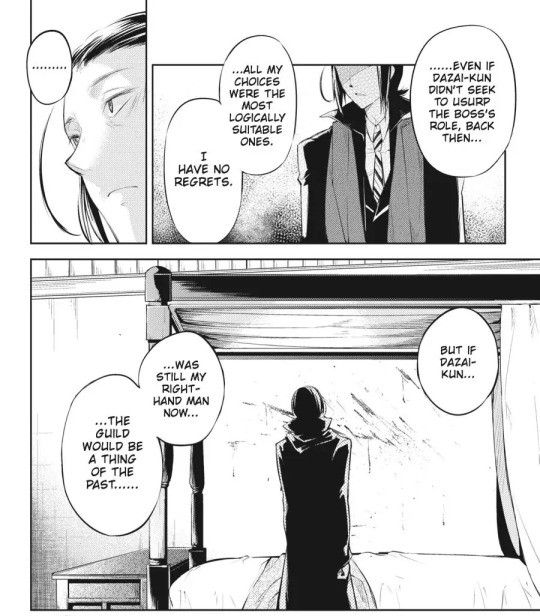
Now that’s been paved out, where does wanting to save Dazai fit into this? If I had to assume, it’s the same reason he didn’t shoot Dazai for leaving his office during Dark Era. He cared about that boy, for 4 whole years he left him and his seat alone when the logical thing he should be doing was replacing him, but as much as he might’ve cared, he needed to put the mafia first. He didn’t let him die because of his use, but also because of their so-called “common destiny” in his eyes, a diamond in a rough he might’ve disposed of otherwise if he didn’t see his potential. There’s not much he could’ve done for Dazai here except keep him healthy and alive. Mori gets tons of flack for not trying to help him, but there's nothing he could've done, not in their position.
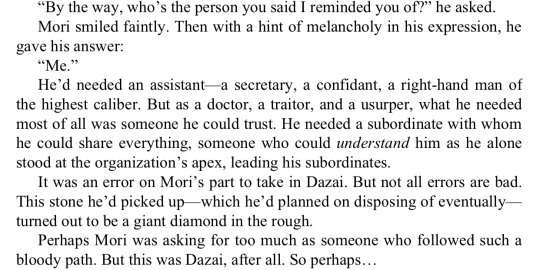
He can't cultivate his potential if there is abuse involved because there is no logical reason for him to do anything to Dazai. You guys have to stop assuming the worst when it comes to Mori, you’re missing huge character details that are right in front of you. The difference between Mori, the Boss of the Port Mafia, and Mori, the Orphanage Director is that he had time to rekindle his humanity so he’s able to care about him like a normal human being, feel guilt, and admit regret after Beast Dazai has died. Mori at most was responsible for ingraining tactical strategies and theories and molding him into the perfect Mafioso and right-hand man.
Not to say any of those aren’t a bad thing. He’s still a child and having him use his desensitized, intelligent mind to build the potential in what he could do for the mafia, it’s just that he’s responsible for very little in Dazai’s personality. The only answer I could give about Dazai being abused by Mori or being abused under the credentials that he’s a child in a violent, unsafe place is the same answer given earlier for Chuuya: in his case, not really.
Regarding this, I retract my statement about anything I’ve said about Beast Atsushi not being a victim in his time in the mafia, but I still hold my stance that he’s not the victim of the port mafia. I want to say the same thing about Beast Dazai and Atsushi that I do here, but considering he picked him up and trained him like how he trained Akutagawa, there’s a great chance Dazai emotionally abused him when you read their interactions. Not physically as that would make him too much like the headmaster, but just enough emotional distress in bringing up traumatic moments to manipulate him into doing what he needs of him.
It’s not a good relationship, but Mori wasn’t targeting Dazai in any real way like the Director and Atsushi or Dazai and Akutagawa. Unlike every other section, I have to conclude that he didn’t do anything to Dazai in that regard other than treating him like another adult when he shouldn't have. I don’t have much to say negatively about their dynamic otherwise. Just a weird, terrible son with his weird, terrible father. It’s more like someone who's taking after their mentor’s teaching and methods rather than an abuse victim echoing their abuser. This is why I don't accept the “Cycle of Abuse” as how the fandom understands it. It tells me a lot that people resort to the blame game.
I wonder what Dazai and Mori’s relationship would've looked like without any of this in the middle. Maybe something in cadence with Ranpo and Fukuzawa, but I can't help thinking that accepting Atsushi as his son in Beast instead of a student wasn't just for Atsushi’s sake. He was about to call him his student too, but immediately changed his mind. He already admitted he was helping him because of what happened to Dazai, so it can’t be a huge jump to think that in the same way this is Atsushi’s redo in building a relationship with a father figure, this is Mori’s redo to give him some atonement for the boy he failed.
A Mother’s Love
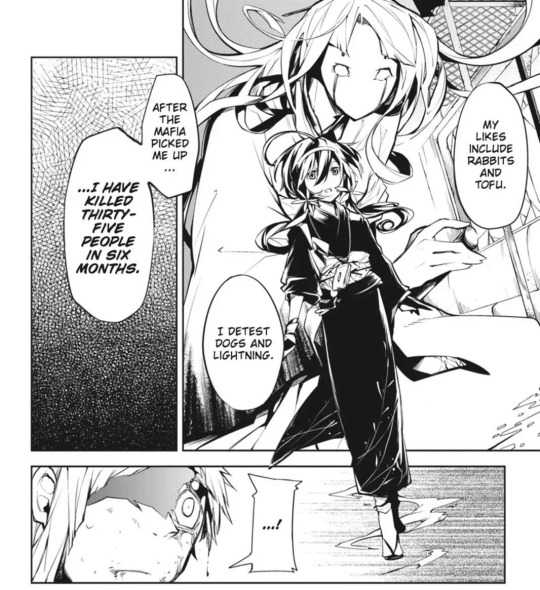
Kyouka, when we first meet her, appears as a force to be reckoned with. With skills a young girl shouldn’t have, and a demon shadowing behind, she’s a terrifying opponent. Quickly though, that appearance falls short in tragedy when the bomb Atsushi’s after is found on her own body and when he asks if she truly wants to kill... She has no answer, but her actions speak clearly. She gives him the defuser because she doesn’t want any more people to die, but the man behind the phone will not let it defuse.
So Kyouka does the next best thing to save more from dying: falling off the train with the bomb that’s about to go off. As long as she dies with it, nobody can use her and her abilities to massacre the people on the train when the bomb eventually fails to do what is necessary. Because that’s when Atsushi realizes that she cannot control her ability herself. No matter what she genuinely wants, she will never have the ability to obtain it because of this one fact. She can only be what people tell her she is.
We all know this story well, she gets saved by Atsushi and the man behind the phone is Akutagawa. Atsushi offers her the same kindness Dazai extended to him regardless of his reputation and destruction because it’d only be the right thing to do. He knows her incoming fate of eventual death for her crimes, he can’t do much, but she should at least experience normalcy this one time.
When she’s about to turn herself in, Akutagawa stops her and tells her she did her job well as a decoy for him to capture Atsushi. I don’t know if you’ve noticed, but there’s a peculiar oddness about Akutagawa here in his attitude towards Kyouka. In all logic, even though she is a strong tool to the mafia, she’s a low-level member, a disobedient one at that, and should’ve been killed on sight for her betrayal considering how quick he is to violence, but he talks as if nothing even happened. He brushes off any thought of her dying as she’s spouting nonsense and that she’s going to go back to the mafia as normal.
But then he spouts off about how she’s better off dead on the ship if she stops killing. What’s up with that? It’s not completely obvious at first, but he’s projecting his own experiences in the slums and beliefs formed from Dazai’s mentoring onto her. From his time when he wasn’t in the mafia, he tells her there’s nothing left out there for people like them, there’s only rock bottom. He can confidently say that there is nowhere that would accept her for her ability, demon snow, because it’s the same for him.
The only way her life can have value is to kill to be useful, just like any good mafia member. It’s exactly why that flashback with Dazai happens here. He’s the one who fed him these thoughts he’s lived with for these past 6 years, and what she’s been believing for 6 months. He doesn’t loathe her, he sees it as doing a favor for her. What else can a little girl who can kill be use of except to kill in her circumstances?
Contrary to popular belief, he is not her abuser and is not the same thing Dazai was to him. He neither trained her nor did we have information on their relationship to come to that conclusion. The only thing we know is that he was the one sent to pick her up by the Port Mafia. We can prove she is not the way she is because Akutagawa since Beast, well, exists. She is one of the few characters I can confidently say was a victim of the Port Mafia itself and not just a person of the Port Mafia specifically.
Akutagawa was trying to be what Dazai was to him, but he is selling a bastardized version of it to her. The person who was her Dazai was Atsushi, the same person who was given Dazai’s act of kindness. Someone who has experienced the same things Akutagawa has and is living proof that she can hope for something better.
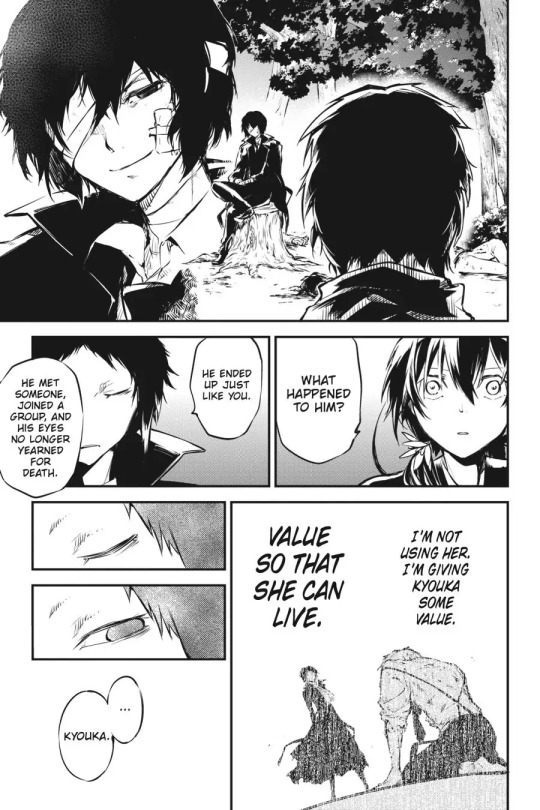
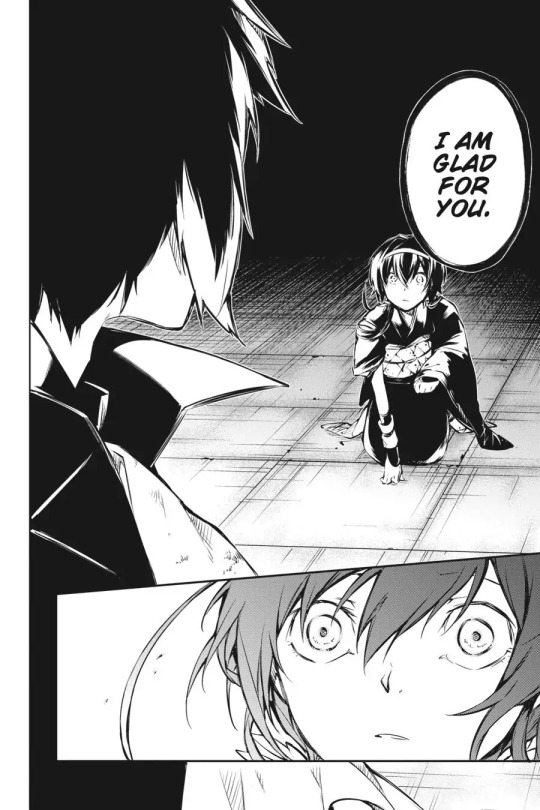
He could see that the same revenge and lack of regard for her life in her eye was the same kind he met Dazai with. Despite that, these lessons he’s internalized have helped no one, not even himself. She can’t find meaning in something that is the root cause of her suicidal ideation. This life is unfulfilling for people like them who need meaning in life. Akutagawa doesn't realize this because he still has Dazai to be his motivational goal. That’s why he failed to help Kyouka, Dazai’s efforts would’ve been considered an utmost failure too if he wasn’t actively trying to fix that misunderstanding. Kindness is what actively saves us and helps us grow, the harm in abusive environments will only stunt us. But what happens when kindness is offered to us, but nothing comes out of it except proving us right that we’re unsavable? Then you have Kouyou.
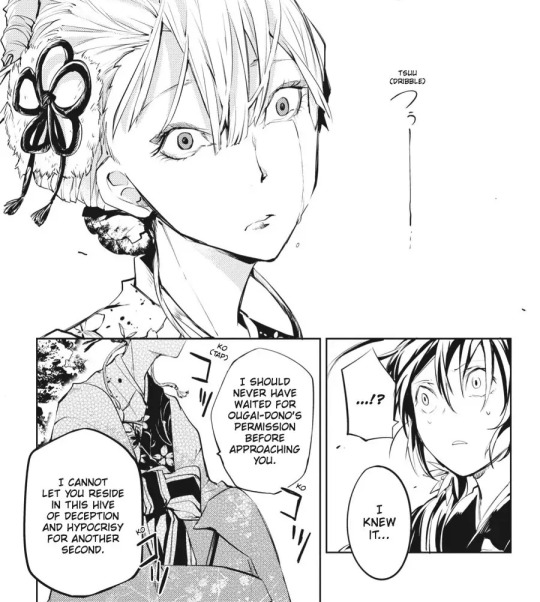
Kouyou is the second person I could say was a victim of the Port Mafia. She has the same belief Akutagawa had about people like them being unable to be saved, so the only thing they can do is embrace it. I can’t claim she was Kyouka’s abuser either as we again don’t know enough, but that doesn’t change that her behavior is emotionally abusive, and is a much better contender than he is.
She’s doing the same thing Akutagawa was doing himself. Seeing themselves in this child and doing what she “needs” instead of what she wants. Just like him, she views this as saving her from the hands of light that will never make room for them and will ignore everything else she says. When Akutagawa is faced with her “disillusionment”, he… accepts it when she refuses his will and chooses another path, but almost kills her to spare her from that decision that would “doom” her.
Kouyou is much less accepting, opting to kill the root source of this hope itself, Atsushi, because her fondness for Kyouka prevents her from leaving her for dead. In contrast to Akutagawa’s attempt at being what gives her life meaning, Kouyou wants to stop Atsushi from being like the same man who also gave her hope that they could escape to the world of light. She can’t bear to see Kyouka go through the same realization she did far too late.
I can see what you're thinking, why am I reluctant to call either of them Kyouka’s abuser? Even if Akutagawa doesn't count, shouldn't Kouyou count because she seems to have an actual relationship with her and her effects are prevalent in Beast, the same points I mentioned to debunk accusations against him? Sure actually, but think about it like this. What the Port Mafia does have in common with real situations is that this is a community that is full of victims who refuse to process their traumatic experiences for any reason, and bring down others to their level when they don’t fit in their narrative to justify what’s happened to them.
There isn’t just one abuser weighing over you, there's this collective pressure from so many who aren't your abuser but they still contribute to your abuse with their presence itself. If Dazai wasn’t there in the mafia, would Akutagawa's situation have changed? Yes. Now if Akutagawa or Kouyou weren’t in the mafia, would Kyouka's situation have changed? Not at all. She’d have fewer examples to refer to, but she’d still be abused. If it’s easier to imagine, think of it similarly to cult mentality and how they keep you in cults. That is the reason I emphasized being a victim of the Port Mafia instead of an individual. Kouyou, Q, and Kyouka, while you can pin their main perpetrators on certain people, their overall situation doesn't change.
Now why doesn’t she just use the phone herself instead of letting people call Demon Snow for her? Wouldn’t she have more agency that way? Atsushi proposes this, but she rejects it instantly. It’s a very simple answer, it’s the same reason she can’t bear to look at it outside of when she’s forced to use it in combat. It’s her ability that killed her parents and why she was forced into this position.
It’s not hard for a little girl to believe she’s nothing more than a killing machine when she sees that night her ability would mercilessly kill her parents. She eventually caves when Kouyou points out how quick she is to vindicate violence to protect that hope she desperately wants a part of, and how she will never change. Her first mission with the Armed Detective Agency is proof in itself. Was Atsushi going to keep extending his kindness after hearing what she could only blame herself for?
Kouyou is a character I’ve seen that gets a lot of double standards compared to all of the other characters I’ve mentioned with abusive tendencies and is almost purely liked. She’s not seen as an absolute monster (The director, Mori) or controversial with one side containing pure dislike and another pure love (Akutagawa, Dazai), it’s only that she’s a well-written, sympathetic badass girl boss. It’s either because she’s a woman, that she doesn’t use an overt intimidation style, that her motives are more obvious in their emotional influences, or all of the above that she’s not treated the same.
Kouyou’s motivations are not special, as I’ve said. The only thing that differentiates them from the others is that they’re not covered by a mask of indifference. As fond as she is for her, she’s not much different from anyone else who holds the mafia up in high regard. She weaponizes her words in where they’d hurt the most so Kyouka would come with her. The entire last section of their battle sums up with her saying, “Kyouka come with me, they’ll only use you for your Ability when they get a hold of it. Even if the mafia did the same thing, at least they’ll accept you for who you truly are: a natural-born killer. You don’t have to fight anymore, I’ll protect you.”
When Atsushi finds Kyouka once again subsequently in her disappearance, she chooses to embrace her violence to help the Armed Detective Agency in this fight with the Guild. After her walk in where she used to reside, she comes the the conclusion she no longer belongs there. Against Kouyou’s wishes, she will brandish her blade for a home. That blows up in her face the moment she starts. Atsushi gets taken, and it’s just as Kouyou said would happen. If even her violence doesn’t get her wish, then what can she do besides leave herself to her fate?
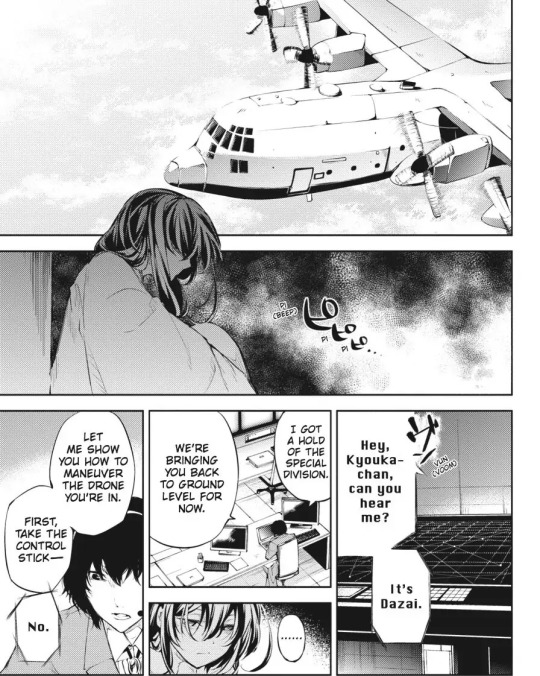
As someone who’s seen another with a talent for killing walk the path of good and is on that same path himself, Dazai talks to her. He tells her about how she hasn’t gone through her entrance exam yet, how she isn’t an official member because she hasn’t proven her will or life on the line to help people she doesn’t necessarily know. Kyouka doesn’t believe she could’ve passed if that’s what it takes, but Dazai doesn’t agree with the points she’s brought up. So what if she’s killed or considered dangerous? That doesn’t make her less qualified to be a part of the Detective Agency, everyone there is from different backgrounds.
She can’t know everything, not even about herself. Nobody does, but it takes others to see more of yourself. Excelling in one area doesn’t prevent you from nurturing your potential in another. What would that make someone like Atsushi, a person who’s been her guiding figure throughout—but was never seen as anything more than a threat or a beast because of his ability before he joined them? The truth is, our lives aren’t defined by one purpose the moment we’re born, it’s only something you can make for yourself. We’re not the places we’ve been raised in, not the ideas people apply to us, and we’re especially not defined by the traumatic experiences we had no control over.
All of it accumulates the person we are today, and we can’t change that no matter how much we resent parts of our image that don’t hold up to what society deems as right, but it shouldn’t take control over what we want for ourselves. It isn’t fair for the victims who were forced into a life where they had to fend for themselves, the children who had to navigate an adult’s messed up world that didn’t have room for them to grow as kids should. Forced into a box where they stay unaware that they’ve ever left their mother’s womb, break out in fury with eyes that grew up too early—only to become lost and thrown away, or rot in that box without a single person knowing they were a breathing, living human being.
I deem abuse selfish for this very reason. Kouyou is wrong for this very reason. If she finds comfort in her reasoning, then I can’t critique her for her own choices and will have to respect her for choosing to stay in the mafia even when the old boss is dead, every abuse victim is different, but not a single person is born evil or good, in the dark or light. Not a soul has to stay in one place because they started there. It’s going to be a hard journey to truly achieve what you long for, results aren’t immediate and not everyone gets there no matter their effort, but still try. Try because it’s still worth trying, because you’re still worth more than you think.
In parallel, you can only get there as long as you’re seeking it. Too many see the Armed Detective Agency as something that will automatically save characters just by working there, but the only way it can help them is if they seek out their help themselves. The ADA is not the right place for every character, but Kyouka does want a place there. After her conversation with Dazai, she knows what she wants to do now. She will smash the drone she’s in into Moby Dick so nobody will have to die, but sacrifice her own life in the process. She’s chained to this place, but her choices aren’t.
She doesn’t have to die with regret, with this she can pass the entrance exam and become an agency member like she wanted. She made a difference for herself just by this act. It’d be a pretty melancholy arc if it ended like that, thank god we know it doesn’t end like this. When you become a full agency member, you gain more control over your ability, meaning—
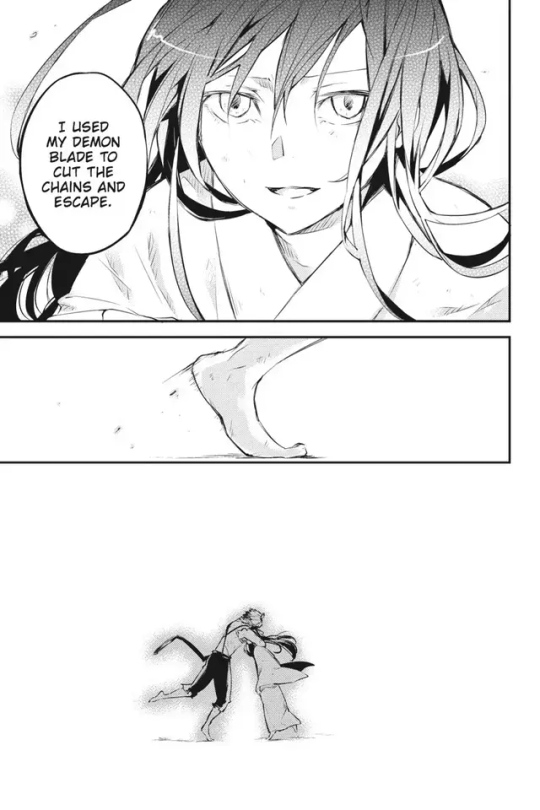
She’s fine.
The exposition is over, let’s talk about Kyouka. Her arc is beautiful and the neglect to talk about her when it comes to her abuse story besides saying, “She’s the one who stopped the abuse cycle” and then nothing else is heartbreakingly superficial. She didn’t stop it, it’s impossible to, but she did break out of it. Kyouka’s section has more exposition than the others but I expected that. I wanted to save her for last because she’s the only one whose arc has come to a peaceful conclusion and not unfinished, and the lighter message felt nice to leave off on.
I shouldn’t berate Kouyou too much, the only reason she stayed in that room after being captured by the ADA is because she did want Kyouka to experience what she never had, and speaking with Dazai helped reassure her that Kyouka would be able to achieve her dreams. It’s no longer the age of the old boss. As well as her shedding the truth about her parent’s death so she wouldn’t have to resent her ability as not an avatar of massacre, but a product of her parents’ love that will always stay with her. She didn’t let go of the phone she’s had this entire time because her mother told her not to let it go.
Me going over Kouyou in this fashion is not me saying you shouldn’t love her character, I like her too. It’s just that it’s passed over so fast what she did, but somehow Akutagawa is more at fault here is mind-boggling. I’d get it a little more if this is because she redeemed herself by wanting the best for Kyouka over what was best for the mafia, but I doubt that’s the case when that moment is talked about so little as well.
I genuinely need you all to understand that not every character is going to have a satisfying, clean conclusion like this. Akutagawa’s story is most likely not going to have a conclusion that satisfies everyone and you should respect it when it comes. There’s no perfect way of writing abuse, but there’s no correct way of doing it either. I don’t think Dazai is going to have the repercussions you want him to have any time soon. If you got the message from Beast, getting revenge on an abuser doesn’t make us feel better or let us process what happened to us. Total resentment keeps us stuck.
The only thing that will heal us is the kindness so many offer in this series. You in no way need to extend that kindness to an abuser, you don’t need to forgive them or let them into your life again, but be kind to yourself and don’t let resentment prevent you from focusing on yourself. Forgiveness and reconnection are not the same thing. Don’t be angry when a victim does want those things. Unless it’s character inconsistent, that’s not something we shouldn’t have any opinion on as the right or wrong way to go about their lives. What if later they do change their mind and want something different from what they originally planned? That’s fine too. Everyone is different. Don’t give unsolicited advice to people who do not want it, let them decide for themselves. It is the best thing you can do.
The worst abusers are the ones who refuse to change and see wrong in what they’re doing, but what about the ones who do want that? Then also let them heal. They did something awful, why isn’t it a good thing they want to stop it now? You don’t have to let them in just because they changed though. Apologies don’t fix the damage already done, but to some victims, it feels nice to feel that what’s been done to them is acknowledged. You don’t want them to hurt others the way they’ve done to you, and neither do they. It hurts to let them forgive themselves when you haven’t and never will, you want to see them suffer, but that’s the only way things can change.
Dazai has changed, is he a good person even after what he’s done? I despise this question for any character of this series. He’s grown so much, and if you don’t think so, reread his conversation with Kyouka I beg of you. It is a far cry from his mindset in the mafia. A better person for sure, but a good person is hard to define for anyone in this series. The mafia is still the mafia, do any of them qualify as good people? The government, even if it’s the position of the right in society, is still an unjust system.
What a good person is cannot be an objective answer, people think there is but it’s not. A good person is how much we know about them and where our position in life affects our viewpoint. Prejudice values don’t make you correct in what you think a good person is, being convicted of a crime, one you might not even have committed, doesn’t automatically make you a bad person, being associated with a group doesn’t mean anything about who you are, etc. It’s all subjective in the end.
Meaning someone like Odasaku is essential in a story like this. He still has a presence in this narrative, even if he died in a light novel, because his existence pushes the boundaries of a “good person” in the fact his contradictory existence establishes itself. He failed in walking the path he wanted, but he doesn’t regret it even in his dying moments trying to.
Afterthoughts
The themes of morality and humanity go hand in hand with the abuse present in Bungou Stray Dogs, so it was hard avoiding talking about this when it was necessary. I don’t think it’s right of us to judge a character’s path that isn’t finished, in a story that’s nowhere near done. Ultimately, I’m only talking in a place of experience but never will it make me exempt from any personal bias. I tried to be as objective and nuanced as I could about this, and I hope it shows.
Abuse isn’t one of those things that I can analyze from any logical stand point or take resources to back my statements up about abuse. Of course everything I say can be backed up, but abuse is a personal, human matter and we’re just human being trying to figure out more than we can handle. I just couldn’t be comfortable with how people are now choosing to talk about Asagiri and needed to shed some light in what you’re missing.
Now I could’ve gone over Higuchi or Lucy because their stories also involve abuse, but I don’t think I could say anything new about them without repeating points I’ve already said. We know very little about Higuchi and what made her so devoted to Akutagawa, and Lucy is pretty quick to summarize considering her story is just like Atsushi’s. Q is also a character to be brought up but I don’t have enough information on them to say much about any abuse itself that happened.
Yosano was also an option but I don’t think anyone had any trouble understanding her backstory. Well I was only really aiming to speak about what’s not been spoken enough. Thank you for reading haha, god this thing is monstrous. Already got to 14k words by the time I was officially done…. I didn’t know if I wanted to lean into character analysis or just exposition, I hope it’s a good enough mix of both. This took way longer than the 4 days I was planning to write this in.
I was later reminded that I could do a post on how their abilities functioned and reflect on their abuse/traumatic events, but I didn’t think I’d have enough room for that here. It could be a bonus post eventually? I don’t think I did Kyouka enough justice in that aspect, but i’d just be beating myself up again about not making this perfect.
I hope I don’t come off scary or a very serious person? I’m very open to requests or discussions people want to engage in. Oh jeez, I’ll just embarrass myself if I keep talking. Writing this was a bit much, never really liked writing stuff myself. Sorry if glossed over anything, I wanted to stay on topic and not detail into something unnecessary.
The message BSD has is a pretty normal one, but there’s something very special about how it’s written here and I’m happy it exists. Maybe I shouldn’t have made this so long? But there’s so much to express sigh……
#this willy-nilly stuff I’ve been seeing with abuse is annoying#bsd#bungou stray dogs#I wish others understood that it’s good to rethink what they say
186 notes
·
View notes
Text
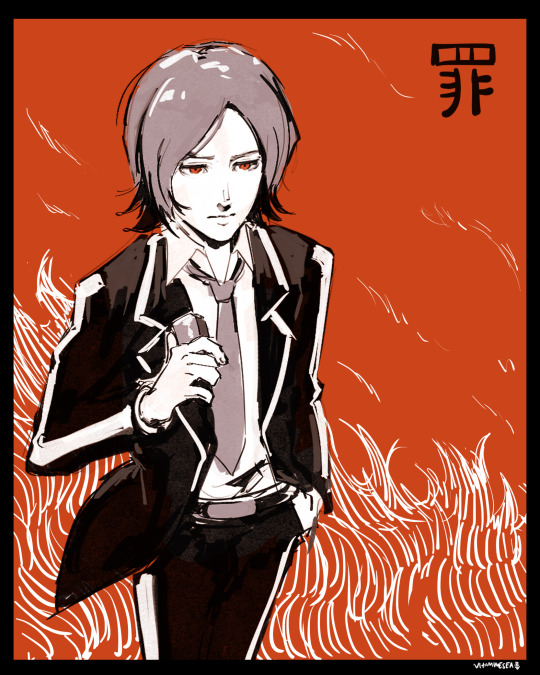

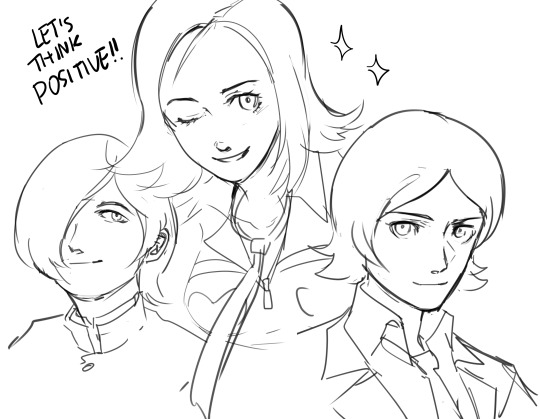

Played innocent sin....... now i have persona 2 disease
461 notes
·
View notes
Text
Alright! Good to know that there is a portion of the fandom that's aware. I hadn't been around too many who were, so it's a little relieving to know I underestimated them and my initial understanding of where it came from was correct in a way.
But learning it out of context… checks out.
I'm not sure why most don't double check and doubt themselves when they hear something from word of mouth. Even when I'm writing something about certain scenes from the main series, I basically reread them as I'm writing because I need to make sure the information is correct. Any fandom is like this, but it's a little grating for me at the moment with the BSD fandom because of certain, very prominent beliefs that no one questions.
Though just to add, these Oiran aspects to her might also come from Kouyou’s novel “Kyara Makura” (伽羅枕). No english translation unfortunately, but as you’d expect, the main character ends up as a courtesan.
It's not entirely fair of me, but I hate the fanon that Kouyou operates brothels for the Port Mafia. She's canonically the Port Mafia's torture czar; that she's oiran-coded more likely references irl!Kyouka Izumi's preferred archetype, Kyouka and Kouyou's relationship, and Kouyou's Edo-era literary aesthetics.
It grates on me that she's so often plucked from her actual role in the Port Mafia, which aligns with her ethos as a flower who blooms in darkness and which reflects that she is beholden to herself and doesn't share Mori's obsession with self sacrifice, so that she can be shoved ill-fittingly into a woman-coded role of archetypal brothel madam. She's a torturer!
That's also why she isn't considered a likely successor to Mori— she's still a leader within the organization, but the nature of her role requires and engenders some degree of distance from the rank and file, and certainly from the public-facing, corporate facet that's bathed in the light she detests.
(Never mind that she's never expressed an interest in succeeding Mori, and that she will always prioritize her favorites over the organization as a whole— why should she be made slave to the organization when that would preclude her from spending substantive amounts of the annual budget to rob the special division's armored vehicles for her best girl? She didn't hesitate to cooperate with Dazai for Kyouka's benefit even though it disadvantaged the organization— she does not want to be, nor is she suited to be, the Port Mafia boss.)
Also, brothels in early Yokohama were state-run. That's the Special Division's purview, which makes sense, given their utility for espionage and information gathering and dissemination.
Anyway; well-wrought female characters are substantive, not descriptive. Kouyou is a fleshy character whose contrasting tenderness and viciousness are contoured by her tendency to act on her whims and her unerring devotion to the individuals she adores.
Thrusting her in roles that would force her to act outside of her motivations and desires when the sum of her arc isn't her victimhood isn't compelling to me; it strips her of her dynamism. Contriving roles that don't exist based entirely on her aesthetic without any consideration of her characterization isn't better.
idk why do women have to be archetypes to be well written, why can't they be messy 26 year old torturers who embezzle organizational funds and brat tame their bosses.
#I would just buy a jp copy for myself but I have too much on my plate with Oda Sakunosuke#translating things takes a lot of time#also… I don’t want to spend too much money right now
97 notes
·
View notes
Text
It's not entirely fair of me, but I hate the fanon that Kouyou operates brothels for the Port Mafia. She's canonically the Port Mafia's torture czar; that she's oiran-coded more likely references irl!Kyouka Izumi's preferred archetype, Kyouka and Kouyou's relationship, and Kouyou's Edo-era literary aesthetics.
It grates on me that she's so often plucked from her actual role in the Port Mafia, which aligns with her ethos as a flower who blooms in darkness and which reflects that she is beholden to herself and doesn't share Mori's obsession with self sacrifice, so that she can be shoved ill-fittingly into a woman-coded role of archetypal brothel madam. She's a torturer!
That's also why she isn't considered a likely successor to Mori— she's still a leader within the organization, but the nature of her role requires and engenders some degree of distance from the rank and file, and certainly from the public-facing, corporate facet that's bathed in the light she detests.
(Never mind that she's never expressed an interest in succeeding Mori, and that she will always prioritize her favorites over the organization as a whole— why should she be made slave to the organization when that would preclude her from spending substantive amounts of the annual budget to rob the special division's armored vehicles for her best girl? She didn't hesitate to cooperate with Dazai for Kyouka's benefit even though it disadvantaged the organization— she does not want to be, nor is she suited to be, the Port Mafia boss.)
Also, brothels in early Yokohama were state-run. That's the Special Division's purview, which makes sense, given their utility for espionage and information gathering and dissemination.
Anyway; well-wrought female characters are substantive, not descriptive. Kouyou is a fleshy character whose contrasting tenderness and viciousness are contoured by her tendency to act on her whims and her unerring devotion to the individuals she adores.
Thrusting her in roles that would force her to act outside of her motivations and desires when the sum of her arc isn't her victimhood isn't compelling to me; it strips her of her dynamism. Contriving roles that don't exist based entirely on her aesthetic without any consideration of her characterization isn't better.
idk why do women have to be archetypes to be well written, why can't they be messy 26 year old torturers who embezzle organizational funds and brat tame their bosses.
#bsd kouyou#bungou stray dogs#bsd#i saw this last night and I couldn't agree more!#while I recognize that her outfit and manner is Oiran-based#that doesn't mean she really is that thing until specified as such#now that you're saying it though#I might’ve been misplaced on why she's written as a brothel owner with the Western fandom#while the assumption might come from her being Oiran-like in Chinese and Japanese fandoms#with the Western fandom it absolutely just has to do with her being a woman in organized crime because of the general lack of information#they have on Oirans. I personally assumed that they thought a certain way that I was informed on but I realize that was wrong.#aw geez now I feel like I should put up a huge warning sign on my design analysis now because me explaining why people ASSUME certain#things about a character#that doesn't mean that theyre beliefs I personally hold.#i have a copy of Golden Demon but I don't have enough time with all the other reading I'm doubg#hopefully soon but 💔#edit: just to add on#the brothel owner stuff is very prevalent within all fanfics of all regions#that's why I brought that up
97 notes
·
View notes
Text
*drops down on knees and hands* What do I do…. What do I do with this?
(Behind me is Mori Ougai’s “Maihime” and Yosano Akiko’s poetry chapter and collection named “Maihime”)
There’s only one thing I can do… with Dancing Girl…
3 notes
·
View notes
Text
“All that can happen now is that one foul, humiliating sin will be piled on another, and my sufferings will become only the more acute. I want to die. I must die. Living itself is the source of sin.”
“If it failed I had no choice but to hang myself, a resolve which was tantamount to a bet on the existence of God.”
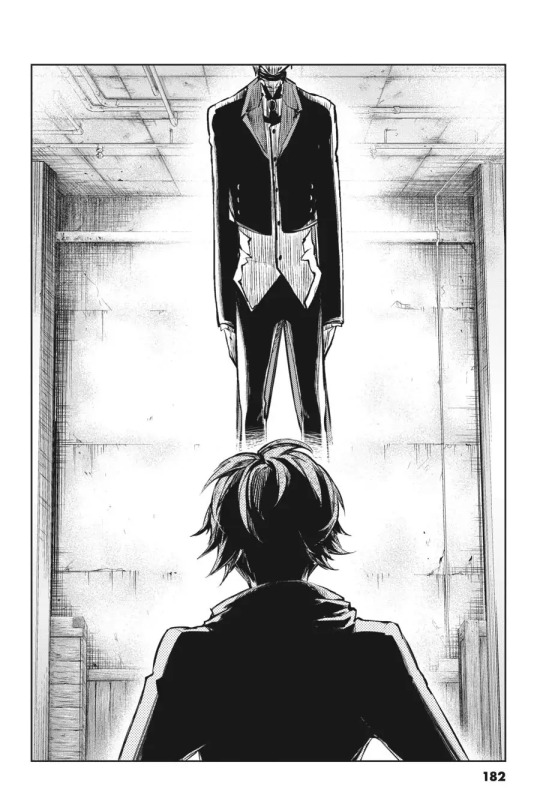
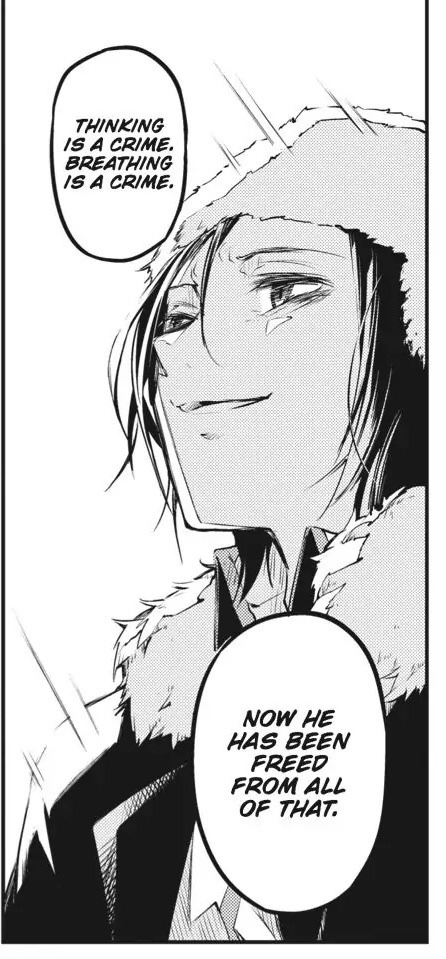
Read a section from No Longer Human I remembered happening, and it just reminded me of this scene. I don’t think there’s an inherent connection here, just an observation of why Fyodor is insistent on Dazai understanding besides the discussion between Oba and Horiki on the antonym of Crime (/Sin).
22 notes
·
View notes
Text
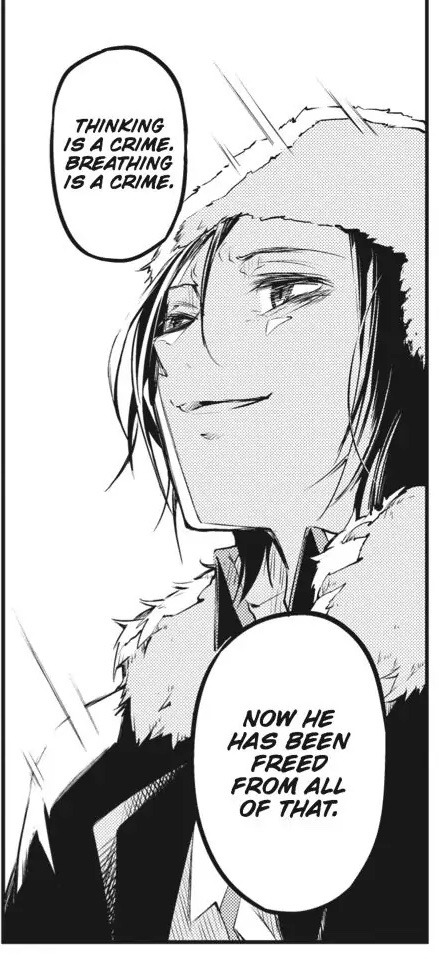
I went back to read this chapter and you'd usually hear “Sin” in this type of sentence, but I realized the reason he said “Crime” instead is because the Japanese translation of Crime and Punishment uses Tsumi (罪) in replacement for “Crime”. So of course they'd translate it like this in the official volume. I did check if he was using it and he was.
(Edit: It technically means both in concept, but the sentence structure just threw me off. When a religious fanatic talks about the sinfulness of human beings, they'd instead say “Thinking is a sin. Breathing is a sin.” don't you think?)
8 notes
·
View notes
Note
Lately I've been thinking about the current progression of the story, obviously we are nowhere near the ending, however, what are your thoughts towards how the main story is going to end?
Based on what we know so far how do you think what do you think the climax and the resolution the story is going to be? Because so far it seems like it's going to be something related to the book, but there's so many plot points and characters that we haven't even really touched on yet and I'm wondering if we ever will (for example the order of the clock tower was this just a one and done thing or are we getting more on that Asagiri????)
I am SO sorry. I got sick on the weekend I was thinking of answering this. Then I got completely stuck on what I wanted to say because honestly I have no idea where this series is going besides a few things I know Kafka Asagiri wouldn't leave behind. I have faith in him and I feel like him pulling along Nathaniel Hawthorn for this long into the story and knowing when Fitzgerald would have involvement proves he doesn't forget about his previous storylines.
I see complaints sometimes about how Steinback’s side plot with the Guild is never touched on again and it's like?? Because there's already so much going on already?? I'm personally impressed with how Asagiri handles this bunch of characters and that's why I'm not impressed with complaints about the female characters getting “no” screentime. I think some of you really need to reread the manga because, of course, it would feel that way if you needed to split it between all these characters and have a smaller amount of female characters compared to guys.
It's an ongoing story so treat it like an ongoing story. Some criticisms I see of BSD really feel like they're in bad faith and don't give it any grace. To me, that's really depressing. I don't know what some of you even want from him. I'll move on now to your actual question.
This is a character-driven story with hmm, well I shouldn't say it doesn’t have a clear plotline because the antagonists have a clear goal for The Book, but it's not a story where the protagonist is driven to do anything besides overcome himself. I have ideas on what future plotlines would look like, but not all of them.
There are things that are absolutely going to be followed up on. Like how 55 Minutes’s story was left on a mystery to be explored in a future arc. 55 Minutes was very involved in the Great War and Europe, so I’m guessing some of that will be explored in due time. I’m not very good at guessing so I’m not the best to be asked on theorizing that far into the future.
How about I just speak on the present arc? I think that will be easier and it's good to work with the pieces we have. The ending is much too far into the future for me to come up with anything, really. This series is much too technical with its reference and motivations to say anything other than, “We should expect this stuff in the light novels to play into the story later.”
Since I gave myself some time to think this over, there are some things I am completely sure of having a critical role in the present and future of this story—besides the obvious lasting effects of the Great War and the storm Verlaine mentioned waiting for very much having to do with the Clock Tower’s eventual involvement.
I’ve been thinking about them a lot and I hadn’t realized this was my chance until now! So exciting! I mean these two tend to cross over for me.

55 Minutes is the 4th light novel in this series. Anyone who has read it loves it because of the focus on world building and getting to follow Atsushi for once in novel form. I went into it thinking that it was going to be a quick, self-contained story that happens a bit after the guild arc, but I was shocked to see that there were so many questions unanswered! On purpose obviously to set up a plot line for the future, but man.
While I am excited for many things from the light novels to be answered in the main story, I want to bring attention to the main antagonist. The living ability of Jules Gabriel Verne AKA Gab. Verne was a part of The Seven Traitors, a group that committed itself to stopping the war by any means necessary. They were what the Armed Detective Agency is to Atsushi for him. His ability (The Mysterious Island) absorbed other users’ abilities, so long as they were on an island he claimed as his domain.
By the time the war had ended, he was alone again and the rest of the members were either dead and disappeared. Verne decided to stay and maintain the Standard Island so his friends had a place to come back to. Fourteen years pass and a deadly weapon called Annihilation and it's maker, H.G. Wells, came onto the island. Annihilation had been stolen from her and Verne agreed to help her get it back from the terrorists under the name “Gab”. The terrorist in question being the colonel, not to be confused with the character of the same title who was an executive to the Port Mafia.
This colonel had actually been the former leader of the group who had called themselves Mimic after being abandoned by their country and had heard his men drifted to Yokohama, only to die there in vain. I wonder if that connects to anything that happened in another light novel, wink wink.
It wasn’t hard for Verne to find where it was hidden, but next he had to come up with a way to get it back without using his ability. He decided to join the thieves that had snuck onto the island by turning himself into a teenager and asking to be the pupil of the boss so he could borrow his ability to go through walls. It had worked as planned, until Wells was hit by a stray bullet and died. He was devastated that he couldn't save this one woman.
His solution to save her was to absorb her ability (Time Machine) to go back 55 minutes in time to reverse what had happened. That worked, but then he thought of another thing: if he absorbed her ability again, couldn't he go further back in time to get a better result? Wells’s ability has the condition that it could only send a person back in time once, but by absorbing it again, he can ignore it as if he were using it for the first time. He regretted how many of the colonel's soldiers had died and he never learned his motivations in the end.
He was right, but creating the perfect future is almost impossible because of how someone always gets hurt in the process. Every time he succeeded, there was only the “what if?” hanging over him that this wasn't enough. The more he used the ability, the further he could go into the past. Even larger ideas had come into his head. What if he could reunite with his friends? What if he could prevent the entire war from happening? He hadn't realized just as Wells's ability evolved, something else would too: Gab, the island and the boy he posed as.
It overtook him and left to reside inside his own flesh as an echo of his own self, at the very corner of his mind. He died and Gab had been birthed from it. Gab is an unstable creation and even so, his humanity still urges him to keep living no matter what. So instead of being motivated to repeat time to save others, he keeps living to save himself so he doesn't fall back into the darkness of an unknown waiting for him.
I could keep going and talk about how he's pretty much the embodiment of the themes present in BSD, his resemblance to Atsushi that the narrative points out so graciously, and the nature of what he is supposed to be in the grand scheme of BSD, but this isn't why I brought him up.
55 Minutes has aspects that have appeared in the main story ever since the Decay of Angels have taken their place in the manga as antagonists. Dazai’s ability to control his heartbeat, time travel, Akutagawa calling Atsushi his “trial” and fighting out at sea, and the Great War being the source of the conflict. Now what if I propose my idea of what had happened to Fukuchi to be similar to what had happened to Verne when he had used Wells’s ability?

This is Fukuchi’s corpse reanimated, I think we all know it. While it’s possible Fyodor must've put a safeguard to put the condition for this to have happened or that this is a Fukuchi from another universe, I think what had happened altogether, in the end, was the consequence of using Amenogozen so freely to the point he was messing with the state of the timeline and creating paradoxes. The backlash of this divine blade had either created a divine being or let one reside in him.
It's not only 55 Minutes that has parallels/foreshadows what's to come, but Untold Origins as well. I do like noticing how Kafka Asagiri adds things so they fit more snuggly into what's to come later in the season or make the connection more obvious, like Fukuchi having a feature when Fukuzawa is visiting Oda behind bars and Fyodor appearing on the roof when Fukuzawa monologues about “V”.
I think I've been seeing some people notice this too, but I think the play featured is incredibly important. Like really, really important. I mean beyond any resemblance people saw in the visuals used in the anime background that looked like Fyodor being crucified. I feel unprepared to talk about it, so I hope I make some sort of sense.
“The Living World Is a Dream. The Nocturnal Dream is Reality” is a real quote from Ranpo Edogawa and is used as the name for this play. Twelve fallen angels gather in an old theater to earn god’s forgiveness. They had disobeyed god in the past by wanting to coexist with human beings and were shunned after the fact. During this, they are killed off one by one without the killer ever being seen. The killer, as the script follows, is a supposed angel of judgment, but it's hard to tell for the others if it really was an angel imparting their judgment or a serial killer because of how common the methods seemed to be. That is their mystery to be solved.
One of the fallen angels claims that an angel would use a divine blade to purge them and not methods like these, while another begs the question of why a fellow sinner would go after them and that an angel would have a real motive to have them killed. Their reason to going to this old theater is because they were searching for an ability user. In this fictionalized story, ability users are angels who had fallen but were able to atone and given a portion of their power back. Their hope is that when they encounter the ability user, they will gain atonement as well.
Suddenly, Murakami (the lead performer) is stabbed by a blade that came from nowhere. Completing the promised threat of an organization named “V”:
“An angel shall bring death, in the truest sense of the word, to the performer.”
So, what happened?
As he takes his newfound identity as an “ability user” in pride on stage and claims himself to be the savior of all, Ranpo explains that the angel that the play refers to is the audience watching it. A metaphor to how the audience is invisible to the characters on stage and knew almost every that had happened, but Ranpo also says that because the audience couldn't have laid a finger on the them, it means the angel couldn't have been the killer.
The “angel” was more the victim than anything and the so-called judgment imposed was the show of what was originally regarded as another victim. The switching of roles. The same thing has also applied to this murder. While Murakami was regarded the victim, the accused killer the police suspected was a man under a fake name who has randomly disappeared. Tied up behind the currents, the man had been here all along. The true victim of this case.
Which makes Murakami the real culprit of his own “murder”, but he's only a piece of the picture. After getting arrested, he speaks about how he had planned with the playwright about this but has no clue what capturing the older man was for. Not even after saying this, a detective rushes in saying that the playwright had been impaled with no weapon to be found.
Again, after an officer who had worked for the mysterious group “V” and tried to kill Ranpo after refusing to join them had been arrested, he was also killed the same way as the playwright. I feel like I don't even need to say that this “V” group is obviously the Decay of Angels after laying that out. The same motivations as Fyodor (”rid all evil of this world”) and the sword business is Fukuchi silencing people.
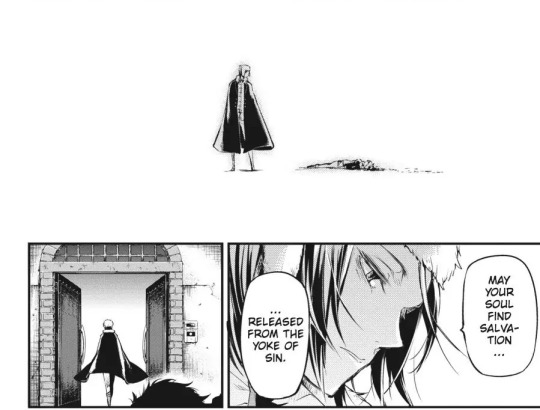
What was the purpose of the play though?
Besides capturing Natsume Soseki (if you haven't read it), it was foreshadowing for what was to come. Let's abandon the idea that skill users are redeemed angels for a second. Just a second, I promise. Have you ever looked up what Kaumi (神威) even means?
While one of the first results you get will refer you to gods themselves, you should be focusing on a more literal translation. That being “God’s Authority” or greater divine power, making Fukuchi function basically as Fyodor’s own angel of judgment. Let's say that ability users are the sinners and Fukuchi (or Fyodor) is the one imposing their judgment, even if they should've been in the same boat.
Just like the play, they swap the victim (Armed Detective Agency) and the killer (The Decay of Angels) for the public‘s unknowing view. This play is filled with Fyodor’s personal bias and I think the irony of their searching for the “ability user” in the play is that to Fyodor, there's no such thing as a redeemed ability user. There is only salvation of death for this great evil and that is exactly what happens to the characters from the play.
Ranpo filps this narrative on its head and forcefully changes the ending of the fallen angel. He wasn't a part of the story, he forcefully shoved through its bullcrap to create something much more ideal. Something much less miserable. It's a little fun that two people he goes out of his way to help out (Yosano & Mushitaro) both have the title of “angel of death/murder” as that's how the angel of the play is also referred to. Save the killer that was actually a victim…

With that, I really shouldn't abandon how ability users get referred to with titles like angel and demon right? Chuuya had an angelic allusion in Storm Bringer when he activated corruption for the first time, and hell, look at my buddy Gab and his mechanical wings. The further they transcend themselves of their humanity, the more angelic or demonic they become. There really is no true difference between them though.
This should've been about the trajectory of bsd…. Then it became me wanting to talk about DOA crap….
Well, I really don't know much. I connected dots that were there for me, but nothing to say for the future of BSD. I understand what is happening, but not enough to be psychic haha. I mostly went on about that because I didn't want our conversation about what is currently happening to be pushed aside because there's always more to say. Maybe if I read more of the authors involved, maybe I'd know.
If this is disappointing, oh well! It has taken me so long to think of something to say that the new chapter has already come out. Kafka Assgiri always leaves me with more questions than answers.
What even are abilities anyway?
#bsd#bungou stray dogs#bsd meta#bsd analysis#fukuchi ouchi#bsd fukuchi#bsd 55 minutes#bsd untold origins#ranpo edogawa#bsd fyodor#the decay of angels#i should stop narrating the stories of the novels#i was going to say more#but I'm tired#the best I can say is to think of the questions bsd offers you and reread the series at any chance#you'll get more information each time and come up with more ideas for the future of BSD
18 notes
·
View notes
Text
Oh my god, just as I was looking at my package tracker, I found that it's already here?/$/&:&: holy shit wait, I haven't opened it yet. Give me a second to open this.
#omg I thought it was going to come tomorrow or over the weekend#got this baby all the way from Osaka#I wanted to buy more volumes but that's too much money
1 note
·
View note
Text
You’re absolutely right that they’re not the same. I think a lot (or some, I already forgot what I wrote) of what I had just said is based in some of my in-moment bubbling thoughts about I interact with BSD and some insecurities in how I approach it. I always have this impression that I have to give some “bigger insight” into something I’m reading, even though (as you said) that’s not what is expected of me. I’m not very nice about it to myself, so a bit of that projected here.
So I almost hadn’t reblogged this because of how I realized that I had gone too personal for a topic like this and progressively strayed off, but I had already been writing for awhile and I didn’t want to dump it all into the trash. I also just wanted to see what you’d say haha.
I was a teacher's assistant for legal research and writing in law school. An issue many first semester law school students grapple with in their writing is understanding the difference between analysis and summary, or analysis and observation. This is also something tumblr.com analyses struggle with.
33 notes
·
View notes
Text
I hope you don’t mind me commenting on this because man, this is a topic I reflect on a lot when I personally post things. This kind of thing show up a lot with the current “Video Essay” format on YouTube where the standard is to create an hour long video (or longer) on a certain topic or series, but some of them just end up being summaries and don’t add anything new to my knowledge prior to watching.
For Bungou Stray Dogs in particular among other content I’ve been engaged in, my immediate response to how I interacted with the text when I first joined into conversation last year was surprisingly a lack of interest in analyzing it. Now I don’t mean that I don’t enjoy BSD or that its content isn’t interesting because I wouldn’t be here if it wasn’t, but it was that I recognized the way it sells its broader themes to the reader to be almost straight forward in a way.
The ones people talk about at least, which might’ve added why I wasn’t all that interested in the beginning. The BSD fandom is really interested in touching the same topics over and over and over. I don’t mind this at all, but at the same time, I do mind because they engage in it the exact same way and read into scenes the text has already explained to them. The point of analysis is to break it down and build it back up into something more than it was before. It’s to create a new perspective that the text doesn’t immediately tell or something the text hadn’t fully intended.
The common fault with most fandom interaction with the media they like, or with anyone really when touching analysis, is that they only break down the parts they’re told and base their opinion on purely that. They’re not all that interested or know how to use their own perspective to their advantage without removing bias. Analysis had many factors depending on what lens you’re using as well. We should be asking what commonly comes up with the author’s writing and what theme can you recognize (intentional or not) from previous media you’ve also consumed, along with knowledge you’ve accumulated over many fields.
On that note, I do not recommend trying to force something into being what it isn’t because the point of using that previous knowledge is to know when you can apply it and when you can’t. That doesn’t always apply with certain types of lenses for analysis (even if will end up seeming flawed to the reader and be criticized), but it’s something I wish more had an awareness for. For example, when you’re analyzing a comedy, you need to be aware that the genre is comedy and you can’t compare it to something out of its genre because there’s different expectations to what that media provides compared to a show in the action genre.
Besides that though, sometimes it is hard to tell when the things you pick up on when observing that piece of fiction is really you analyzing the text or plain observation with nothing added on. I don’t struggle too much with this personally, but I tend to be hesitant when posting in the BSD fandom at first and calling it analysis because I saw it as just summarizing it. If you take BSD’s content in without the real life and literary influences that Kafka Asagiri has added into this series, then only analyze it without that prior context, the reading will end up not as interesting as it could be.
For me, that’s what it was like because I wasn’t immediately into the idea of reading the actual works by these authors and these influences. BSD also has this habit of explaining thing eventually, so it still made it feel like summarizing. When I wrote my overview of the abuse depicted in BSD, I did not call it an analysis in the title because it wasn’t really. I tagged it analysis because I knew it would bring it attention, but in the end it was just me going over what fans should’ve known. It almost made it feel like an analysis because I approached in a way people didn’t, but it wasn’t and I chose to talk about it because I was getting annoyed.
Maybe there were some parts that counted as analyzing, but that’s all. This is not at all me saying Asagiri’s writing depends on the knowledge of these influences to be interesting, but that we need to know some things to appreciate it further. There are themes that are not touched on enough by the fandom that can be explored and, to be totally honest, I found the most interesting character to analyze within the text itself to be Mori because of how much to him was left up to air.
Obviously, when I talk about myself, this doesn’t imply the way some fans analyze the text is bad and maybe some of it is me comprehending what’s going on too fast to consider it analysis, but there’s some underlying doubts within me that I needed to voice.
I was a teacher's assistant for legal research and writing in law school. An issue many first semester law school students grapple with in their writing is understanding the difference between analysis and summary, or analysis and observation. This is also something tumblr.com analyses struggle with.
#I know you weren’t talking about bsd in particular because this is not special to them#I just wanted to take the chance to talk#sorry for word vomiting#this all comes from observations of my time with fandom#oh fandom… what do we do without them#totally went off note a couple times but oh well
33 notes
·
View notes
Note
So so tired sending this because it’s late, but I did want to send that ask about what you think of Mori and Dazai’s relationship and how it parallels anything related to their real counterparts! So here it is! Type to your heart’s content.
Oh my god never type out long posts without saving drafts, your dog will bark and startle you and the window will close and
The literature is just a springboard for discussing the characters, so it's just a discussion of the inspirations and then how it's handled in canon, as evenhandedly as I can.
Anyways, I'll just start out with what little exists of the author Dazai's opinions of the author Mori Ougai. Mori died in 1922 when Dazai was 13 years old, so they never had a professional relationship as fellow writers, of course. But it's funny how casual Dazai is when he discusses this august literary figure, which he himself comments on later.
There are at least three specific stories with mentions of Mori Ougai (he calls him Ougai so I'll use that I suppose) in Dazai's writing that I can think of (paraphrased; please correct me if I'm wrong):
Hanafubuki, where he mentions visiting Ougai's grave and how he wished to be buried next to him. This wish of his is well-known because he really was buried across from Ougai after his suicide, so that portion of the story has been translated many times. But the first part of the story is kind of hilarious too.
To paraphrase it, in his opinion the greatest literary figure of the Meiji and Taisho eras (1868 - 1925) was certainly Ougai, Professor Mori Rintarou, especially because he threw hands with rude people even at the age of 50. "No way!" someone might say, but he swears it's all true! Dazai himself has neglected his martial arts training for the past 30 years, so he admires how writers of old weren't weaklings. If more writers had judo belts, critics wouldn't talk shit. Ougai was a military man and the Surgeon General, so his physical training and discipline (at least compared to modern writers) added a certain dignity or composure to his writing.
Dazai himself had been skeptical about this story about Ougai getting into fistfights, but when he read through all of Ougai's collected works, he found a story called Social Gathering (懇親会) in volume 3 where Ougai got into a brawl with a rude drunk newspaper reporter and they fought so hard that they fell off of the veranda and had to be pulled apart by the other partygoers. Afterwards everyone toasted Ougai's health, and Dazai imagines the bloodied Ougai (who was not a big drinker) drinking all of these celebratory cups with a grimace. This story delighted Dazai when he calculated that Ougai had been 48 years old and Surgeon General for 2 years at the time of this scrap, but also depressed him because it proved that Ougai really could fight and Dazai's the sort of coward who shakes in his geta when drunken university students insult him. He then quotes the relevant passage from the story, but it's not in Aozora Bunko I think, and Dazai's collected edition is probably the 1924 one (more on that below).
After reflecting upon his weakness he goes to the graveyard behind Zenrinji Temple where Ougai was buried. This is when the most famous passage about Dazai and Mori comes in, which was discussed in this post by dazaiarchives on twitter (the translation below is from their post)


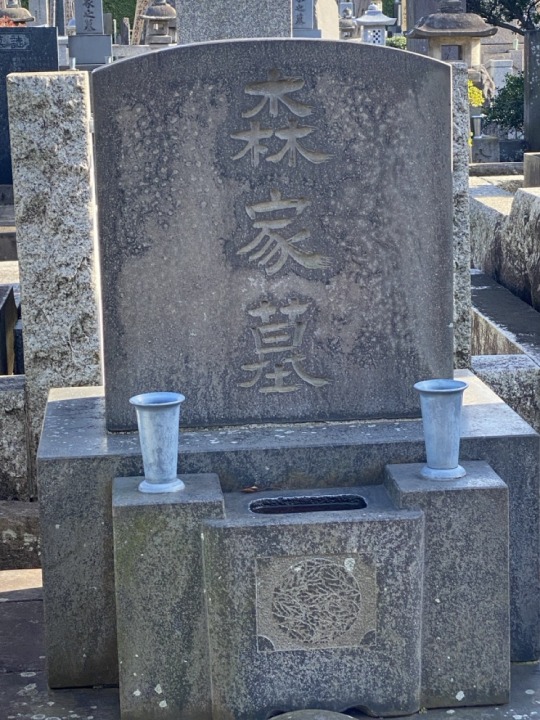

I'll just add in my own photos of their graves which I took in 2019; they're slightly diagonal and facing each other.
2. The "Digressions" in his story もの思う葦, where he mentions Ougai and Natsume but it's only two sentences so there isn't much to get out of that.
3. Finally, there's the preface of his 1940 story 女の決闘 (A Duel Between Women) which was a playful adaptation or riff on Ougai's 1912 translation of German playwright Herbert Eulenberg's Ein Frauenzweikampf, which is the story of a strange duel between a man's wife and mistress.
Dazai explains that this is a story from volume 16 of the collected works of Mori Ougai (1924 edition) - which are borrowed from a friend, since he doesn't have a home library and despises showy displays of learning. He has noticed that when poorly-read people want to seem smart about a subject they know nothing about, they'll just blithely say, "Professor Mori has said..." If Ougai knew how many "students" of this sort he has now, he surely would be confused and blush.
He particularly dislikes how people associate Ougai with reading something difficult and esoteric and lofty, so simply "studying" Ougai is enough to make you wise, and you "study" him rather than read him. Dazai doesn't think Ougai's writing is difficult at all; his writing is always graceful (as opposed to Natsume, who he finds tedious). But people like certain university professors have made it seem taboo for ordinary folk to read Ougai for pleasure and he should only be appreciated by wanky graduate students who 'study' him and write long papers. He thinks that's a sign of shameless ignorance but society thinks that's wisdom.
At any rate, ignorant normie Dazai is going to read Mori Ougai, so Dazai encourages the reader to make themselves comfortable, as he is the sort of person who lounges comfortably to read, not sitting up straight and proper. The reader shouldn't feel intimidated by Ougai; Dazai himself is no scholar (he says modestly).
***
So now Dazai's comments on Mori Ougai are out of the way, what can we perhaps take from that? Dazai greatly admired Ougai's writing, but thought people were too intimidated by his reputation and should just read him for pleasure. When he writes about Ougai, he both enjoys the writing and imagines the man behind the words. It's both playful and genuinely respectful. He thought Ougai's writing had a grace and discipline that his own lacked.
Even though their writing styles are different, both Ougai and Dazai are authors who carefully curate what they reveal about themselves, even when they are writing stories that seem autobiographical or confessional. You're tempted to think you know the author far more than you actually do, because they weave in enough personal experience to give the stories realism.
Regarding their relationship in BSD, I also like to think about how the authors write about childrearing. If you read other works by Dazai and Ougai, and compare how they talk about children....yeah Ougai's a way better choice for raising a kid. If you want a sad, slightly disturbing perspective on Dazai and his own children, you can read Cherries, where he frets about his (actual) son with Down Syndrome and semi-seriously fantasizes about committing murder-suicide with his own disabled son. (Translation at link)
Now, the kids. The seven-year-old and the little one born this spring are a trifle prone to colds, but, well, they’re no worse than anybody else’s kids. But the four-year-old boy is as skinny as a scarecrow, and he can’t even stand up yet. He’s unable to speak. All he does is make a funny noise or two. He doesn’t understand what people say to him. He just crawls about the place and won’t be toilet trained. Even so, he eats like a horse. And yet, he doesn’t put on weight, is really small, has thin hair and refuses to grow.
Mummy and daddy avoid getting into deep discussions about their son. The reason is that it’s all too distressing to admit to each other that they’ve given birth, in a word, to a boy who’s severely handicapped. Sometimes mummy grabs him and holds him tight. And daddy often thinks of getting hold of him and, in a fit, jumping into the river with him and ending it all.
‘Man Murders Mute Son. In the afternoon of such-and-such a day, Mr. So-and-so, age 53, dealer in x at number y, z street, split open the skull of his 18-year-old son with an axe, then shoved scissors into his own throat but was transported to a nearby hospital where he is in critical condition, and recently his 22-year-old daughter was married to a live-in husband, and his motive was to get rid of the son, who was not only unable to speak or hear but was also not very clever, out of love for the daughter’.
It’s newspaper articles like this that plunge me in a drunken stupor.
In contrast, this is how Mori describes a baby in his story Konpira, where a doctor's two children get critically ill with whooping cough and the son dies and the daughter lives:
'The professor suddenly recalled his home in Tokyo. At about that time of the day his wife, who had probably left their baby son with the maid, would most likely be coming home from the public bath with their daughter, who was almost six. His wife had been hoping for a boy and now he was six months old. Already the baby had learned to recognize his father's face, and whenever the professor took the baby's small, still uncoordinated hand and said something, the child's round eyes would close into little half moons and he would stick out his tongue slightly and laugh. In the professor's eyes rose up the sight of his son's face."
In that story he talks fondly about his daughter who loves German fairytales and was obedient even when ravaged with illness, and his sad attempt at making a death mask of his baby son, and his horrible struggle whether to euthanize his critically ill daughter or let her suffer a painful death from suffocation. Historically Mori Ougai lost a baby son and nearly lost his daughter Mari to pertussis, so here is another example of both authors using their real lives in a very careful, calculated way to tell a story, but the way they talk about their children, even as part of a persona for a story, is quite different.
***
So what can we take from that in BSD? In BSD Mori fills the role of Dazai's father/mentor, which is one of the most influential roles in a person's life in that series. You might assume that this means it's purely abusive or harmful - Dazai was Akutagawa's mentor, the headmaster was Atsushi's mentor - but hell, Fukuzawa is Ranpo's father/mentor too. It's an important role, one that strongly influences a child.
To figure out their canon relationship it's easier for me to look at BEAST, because it's the reflection of the main universe and the circumstances that govern their behavior in the canon universe no longer apply, so you can take the relationship in a situation where Dazai has complete control and see how he chooses to behave. In BEAST universe, Dazai knows about the main universe, but has chosen to throw away Odasaku's dying words in favor of preserving Odasaku's life. He's lived through many many AUs and has pared his entire personality down into a husk that will achieve this goal and then die.
So in BEAST, there's a bunch of ways he could have handled Mori if he seriously hated and resented Mori, and in this universe he could do anything he wanted to without consequences.
He could:
Torture and kill Mori for arranging Odasaku's death - he doesn't this time, the final time.
Spare Mori, but make him one of his executives, so Mori will use his intellect on Dazai's command and have the humiliation of having to submit to Dazai's authority - he doesn't, although that's arguably what he does to Chuuya.
He is given the chance to hurt Mori and the perfect excuse that it's "for Odasaku's happiness" - he's doing everything else in this universe, even hurting SSKK, "for Odasaku's happiness" in a sense. But he doesn't kill Mori, he doesn't hurt him, and he doesn't humiliate him as far as we're told. Dazai does all of these things with ease and pleasure to other people, even to poor Atsushi, so it's not a case of being too lawful good for that shit.
Instead, critically, he spares Mori the responsibility of being the bad-cop Port Mafia Boss which honestly seemed to make Mori unhappy in the main universe. He gives him the role of being the father/mentor to OTHER CHILDREN, which is insane if Dazai felt Mori had been a cruel mentor or a bad dad or that he couldn't be trusted with children even though he'll definitely murder a few orphans for a good enough reason and makes lolicon jokes. He sends Atsushi there to recover from how Dazai had treated him in this universe, and unless he hates Atsushi for some reason, why would Dazai send him to someone he hates who he thinks would hurt him?
To me it seems to indicate that Dazai thinks of Mori as his father or mentor who had tried to help him, he understands logically why Mori did what he did, and he likely would have been completely fine with the plan to deal with Mimic if Odasaku wasn't the unfortunate sacrifice. It was the logical solution, and the Port Mafia Boss is the position where one has to make painful calls like that.
Even in the Dark Era, instead of rushing off willy-nilly with a bunch of armed goons to SAVE ODASAKU, he goes to Mori first and asks for an explanation, because he knows there will be a logical explanation, even if he doesn't like it, and it's important to know that first before interrupting Mori's plans. Dazai is rational instead of impulsive at that moment, and he knows Mori won't hurt him even if he disobeys him, and Mori kind of walks him through articulating that the reason he wants to act irrationally is because Odasaku is his friend. Then Mori lets him go, since Dazai was also a calculated loss in this plan.
So even with that kind of betrayal, it seems clear to me why Dazai thinks Mori is someone who can help abused suicidal young adults like Atsushi, and Mori confirms that that had been his sincere intention towards Dazai (amongst all of his other crueler responsibilities which made him do things like sacrifice Odasaku, which Dazai had taken off of his plate).
Interestingly, BEAST Mori makes the clear point that he disagrees with Dazai's childrearing philosophies that involve violence; he calls it the barbarism of adults. That's why I took note of how the authors talked about their children, lol
Also, what's funny is that in the dialogue of the light novels like 15 and SB, when teenage Dazai is trying to think logically like Mori, he actually starts talking a little like him and quoting his strategies, and I am reminded of the RL Dazai mocking pseudo-intellectuals who say "MORI-SENSEI SAYS" when they don't know the answer. Mori is an inescapable influence on Dazai in BSD, and not purely in a negative way.
Now, BEAST also supports my thought that in the main universe Mori was concerned that Dazai would kill him not because Dazai was SO MUCH SMARTER THAN HIM AND MORI HAD HURT HIM SO MUCH AND MORI DIDN'T WANT TO DIE, but because Dazai's priorities aren't societal stability and putting him in the driver's seat of the Port Mafia would lead to a new reign of terror in service of whatever Dazai prioritizes, and suicidal Dazai prioritizes almost nothing.
Do I think Dazai wants to hang out with Mori or go back to the Port Mafia? Nah. Does he trust that Mori has his back even outside of the Port Mafia? Absolutely. Mori is the fellow strategist, like Ranpo, who will make sure Dazai has what he needs for his (often suicidal) plans and will send Chuuya to extract him. Dazai can make plans knowing that Mori can coordinate with him even if they don't communicate.
This is all just my opinion, man, but it seems like the historical Dazai would have been annoyed if I didn't read the stories myself and have my own thoughts about them, so there you go.

#mori ougai#bsd#Bungou stray dogs#dazai osamu#ahhh nice nice nice!#love seeing this all layed out!#I’ll let you know if I end up seeing anything else on this#also I do that so much with my drafts that I might cry if it happens again
16 notes
·
View notes
Text
Ah yesss, the 8th volume of Oda Sakunosuke's completed works. Fully in Japanese, and oh! Would you look at that? It contained the work named “Kyōka Izumi” that I was curious about that I couldn't find online.
It's too bad I can't read Japane— [my hand mysteriously moves my cursor closer to add to cart] …hey now, these are some unwise financial decisions I could be making here. Let's really think this through, I mean do I really need to have this—
[I look up and see “thank you for your order” in bright, bold colors]
#japanese literature#the answer was yes#yes I absolutely did#its best I think of it as a birthday present for myself#it is really my birthday though
3 notes
·
View notes
Text
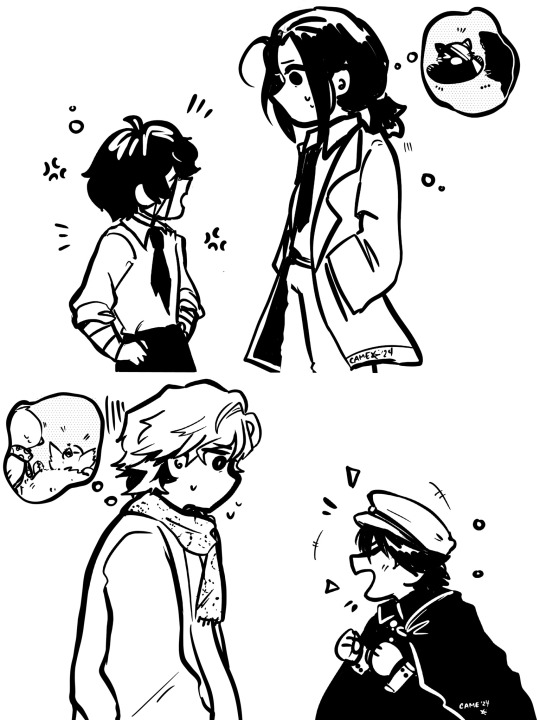
how to deal with a squeaky 14 year old kid guidebook:
4K notes
·
View notes
Text
Unexpected Asagiri
I'm reading a short story collection titled The Ghost in the Shell: Five New Short Stories. Asagiri wrote the third one. It's been the best so far, though it helps that he has an experienced translator. He even references Nakahara Chuuya in the story:

The story also folds itself into the GitS history, referencing events from Stand Alone Complex, Laughing Man, Individual Eleven, and Solid State Society. And unsurprisingly, a couple stories from J.D. Salinger.

(sorry about the dark style)
The background also takes a little from the third manga collection Man-Machine Error and some of the foundational ideas from the 1980s original manga. If you've just seen GitS: Stand Alone Complex, SAC 2nd Gig & Solid State Society, you've got most of the pieces. If you've only seen Awake! Or the movies, you may be lost (like the original book reviewer).
one last bit where Asagiri demonstrates he's either an old school fan or he did loads of research:

5 notes
·
View notes